第二册期末复习
古代汉语-第二册-期末复习知识点汇总
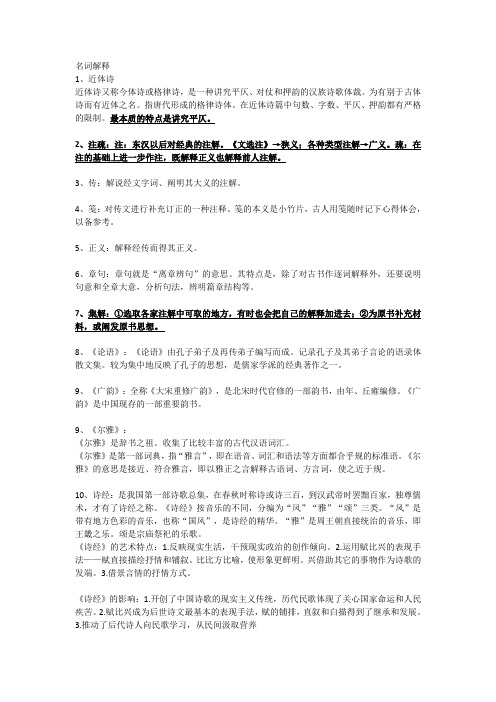
名词解释1、近体诗近体诗又称今体诗或格律诗,是一种讲究平仄、对仗和押韵的汉族诗歌体裁。
为有别于古体诗而有近体之名。
指唐代形成的格律诗体。
在近体诗篇中句数、字数、平仄、押韵都有严格的限制。
最本质的特点是讲究平仄。
2、注疏:注:东汉以后对经典的注解。
《文选注》→狭义;各种类型注解→广义。
疏:在注的基础上进一步作注,既解释正义也解释前人注解。
3、传:解说经文字词、阐明其大义的注解。
4、笺:对传文进行补充订正的一种注释。
笺的本义是小竹片,古人用笺随时记下心得体会,以备参考。
5、正义:解释经传而得其正义。
6、章句:章句就是“离章辨句”的意思。
其特点是,除了对古书作逐词解释外,还要说明句意和全章大意,分析句法,辨明篇章结构等。
7、集解:①选取各家注解中可取的地方,有时也会把自己的解释加进去;②为原书补充材料,或阐发原书思想。
8、《论语》:《论语》由孔子弟子及再传弟子编写而成。
记录孔子及其弟子言论的语录体散文集。
较为集中地反映了孔子的思想,是儒家学派的经典著作之一。
9、《广韵》:全称《大宋重修广韵》,是北宋时代官修的一部韵书,由年、丘雍编修。
《广韵》是中国现存的一部重要韵书。
9、《尔雅》:《尔雅》是辞书之祖。
收集了比较丰富的古代汉语词汇。
《尔雅》是第一部词典,指“雅言”,即在语音、词汇和语法等方面都合乎规的标准语。
《尔雅》的意思是接近、符合雅言,即以雅正之言解释古语词、方言词,使之近于规。
10、诗经:是我国第一部诗歌总集,在春秋时称诗或诗三百,到汉武帝时罢黜百家,独尊儒术,才有了诗经之称。
《诗经》按音乐的不同,分编为“风”“雅”“颂”三类。
“风”是带有地方色彩的音乐,也称“国风”,是诗经的精华。
“雅”是周王朝直接统治的音乐,即王畿之乐。
颂是宗庙祭祀的乐歌。
《诗经》的艺术特点:1.反映现实生活,干预现实政治的创作倾向。
2.运用赋比兴的表现手法——赋直接描绘抒情和铺叙。
比比方比喻,使形象更鲜明。
兴借助其它的事物作为诗歌的发端。
全新版大学英语第二册unit2(成人专升本)期末考试复习资料(5篇)
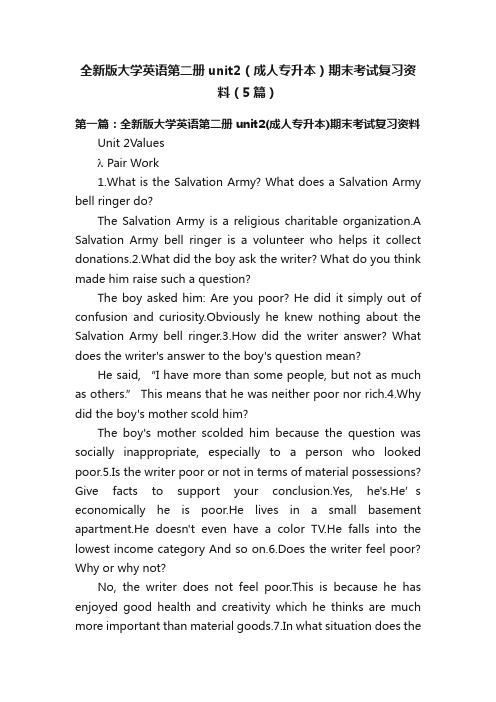
全新版大学英语第二册unit2(成人专升本)期末考试复习资料(5篇)第一篇:全新版大学英语第二册unit2(成人专升本)期末考试复习资料Unit 2ValuesPair Work1.What is the Salvation Army? What does a Salvation Army bell ringer do?The Salvation Army is a religious charitable organization.A Salvation Army bell ringer is a volunteer who helps it collect donations.2.What did the boy ask the writer? What do you think made him raise such a question?The boy asked him: Are you poor? He did it simply out of confusion and curiosity.Obviously he knew nothing about the Salvation Army bell ringer.3.How did the writer answer? What does the writer's answer to the boy's question mean?He said, “I have more than some people, but not as much as others.” This mean s that he was neither poor nor rich.4.Why did the boy's mother scold him?The boy's mother scolded him because the question was socially inappropriate, especially to a person who looked poor.5.Is the writer poor or not in terms of material possessions? Giv e facts to support your conclusion.Yes, he's.He’s economically he is poor.He lives in a small basement apartment.He doesn't even have a color TV.He falls into the lowest income category And so on.6.Does the writer feel poor? Why or why not?No, the writer does not feel poor.This is because he has enjoyed good health and creativity which he thinks are much more important than material goods.7.In what situation does thewriter feel out of place?He feels out of place among people who ate primarily interested in material things.8.What did the girl tell him before her visit to his basement apartment? And whathappened after?She told him that she was interested in what's on the inside.But after he Wok her to his poorly furnished apartment, she changed her mind completely.9.How ought one to understand such “a seemingly abrupt change in her priorities”?It only shows that to her the most important thing was still material goods rather than what she had claimed before.10.Can we infer from the essay what role commercials can play in society?Commercials can put people under pressure to purchase more than is really necessary.11.Why does the writer say “December is the time of year I feel wealthiest”?Because December is the time for him to work for the Salvation Army as a bell ringer, which gives him a genuine sense of belonging and brings him happiness in helping others.12.How has the boy's question affected the writer?The boy's question has helped the writer realize that, despite his lack of expensive possessions, he is rich in many other ways and should be thankful for that. Vocabulary1、Prof.Williams sys that my composition is good except for the ending which seems too.Williams教授说我的作文总体很好,除了结尾看上去太突然了点。
古代汉语 第二册 期末复习知识点
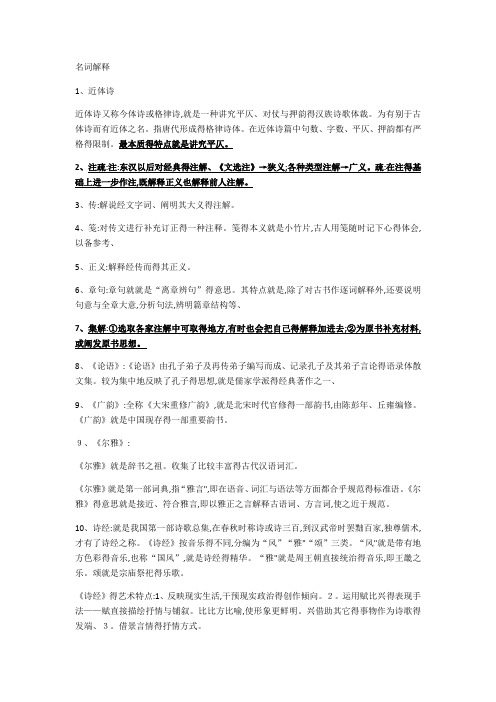
名词解释1、近体诗近体诗又称今体诗或格律诗,就是一种讲究平仄、对仗与押韵得汉族诗歌体裁。
为有别于古体诗而有近体之名。
指唐代形成得格律诗体。
在近体诗篇中句数、字数、平仄、押韵都有严格得限制。
最本质得特点就是讲究平仄。
2、注疏:注:东汉以后对经典得注解、《文选注》→狭义;各种类型注解→广义。
疏:在注得基础上进一步作注,既解释正义也解释前人注解。
3、传:解说经文字词、阐明其大义得注解。
4、笺:对传文进行补充订正得一种注释。
笺得本义就是小竹片,古人用笺随时记下心得体会,以备参考、5、正义:解释经传而得其正义。
6、章句:章句就就是“离章辨句”得意思。
其特点就是,除了对古书作逐词解释外,还要说明句意与全章大意,分析句法,辨明篇章结构等、7、集解:①选取各家注解中可取得地方,有时也会把自己得解释加进去;②为原书补充材料,或阐发原书思想。
8、《论语》:《论语》由孔子弟子及再传弟子编写而成、记录孔子及其弟子言论得语录体散文集。
较为集中地反映了孔子得思想,就是儒家学派得经典著作之一、9、《广韵》:全称《大宋重修广韵》,就是北宋时代官修得一部韵书,由陈彭年、丘雍编修。
《广韵》就是中国现存得一部重要韵书。
9、《尔雅》:《尔雅》就是辞书之祖。
收集了比较丰富得古代汉语词汇。
《尔雅》就是第一部词典,指“雅言",即在语音、词汇与语法等方面都合乎规范得标准语。
《尔雅》得意思就是接近、符合雅言,即以雅正之言解释古语词、方言词,使之近于规范。
10、诗经:就是我国第一部诗歌总集,在春秋时称诗或诗三百,到汉武帝时罢黜百家,独尊儒术,才有了诗经之称。
《诗经》按音乐得不同,分编为“风”“雅"“颂”三类。
“风"就是带有地方色彩得音乐,也称“国风”,就是诗经得精华。
“雅"就是周王朝直接统治得音乐,即王畿之乐。
颂就是宗庙祭祀得乐歌。
《诗经》得艺术特点:1、反映现实生活,干预现实政治得创作倾向。
2。
运用赋比兴得表现手法——赋直接描绘抒情与铺叙。
高中英语 新教材人教版必修二课文期末复习课文原版语法填空和缩写版语法填空
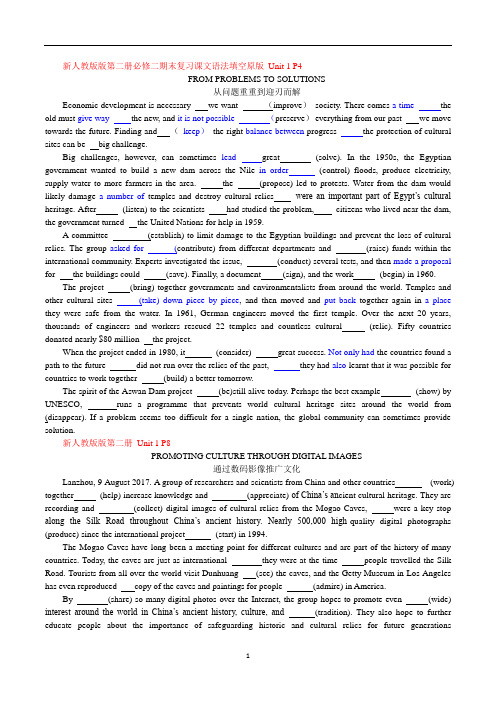
新人教版版第二册必修二期末复习课文语法填空原版Unit 1 P4FROM PROBLEMS TO SOLUTIONS从问题重重到迎刃而解Economic development is necessary we want (improve)society. There comes a time the old must give way the new, and it is not possible (preserve)everything from our past we move towards the future. Finding and (keep)the right balance between progress the protection of cultural sites can be big challenge.Big challenges, however, can sometimes lead great (solve). In the 1950s, the Egyptian government wanted to build a new dam across the Nile in order (control) floods, produce electricity, supply water to more farmers in the area. the (propose) led to protests. Water from the dam would likely damage a number of temples and destroy cultural relics were an important part of Egypt’s cultural heritage. After (listen) to the scientists had studied the problem, citizens who lived near the dam, the government turned the United Nations for help in 1959.A committee (establish) to limit damage to the Egyptian buildings and prevent the loss of cultural relics. The group asked for (contribute) from different departments and (raise) funds within the international community. Experts investigated the issue, (conduct) several tests, and then made a proposal for the buildings could (save). Finally, a document (sign), and the work (begin) in 1960.The project (bring) together governments and environmentalists from around the world. Temples and other cultural sites(take) down piece by piece, and then moved and put back together again in a place they were safe from the water. In 1961, German engineers moved the first temple. Over the next 20 years, thousands of engineers and workers rescued 22 temples and countless cultural (relic). Fifty countries donated nearly $80 million the project.When the project ended in 1980, it (consider) great success. Not only had the countries found a path to the future did not run over the relics of the past,they had also learnt that it was possible for countries to work together (build) a better tomorrow.The spirit of the Aswan Dam project (be)still alive today. Perhaps the best example (show) by UNESCO, runs a programme that prevents world cultural heritage sites around the world from (disappear). If a problem seems too difficult for a single nation, the global community can sometimes provide solution.新人教版版第二册Unit 1 P8PROMOTING CULTURE THROUGH DIGITAL IMAGES通过数码影像推广文化Lanzhou, 9 August 2017. A group of researchers and scientists from China and other countries (work) together (help) increase knowledge and (appreciate) of China’s an cient cultural heritage. They are recording and (collect) digital images of cultural relics from the Mogao Caves, were a key stop along the Silk Road throughout China’s ancient history. Nearly 500,000 high-quality digital photographs (produce) since the international project (start) in 1994.The Mogao Caves have long been a meeting point for different cultures and are part of the history of many countries. Today, the caves are just as international they were at the time people travelled the Silk Road. Tourists from all over the world visit Dunhuang (see) the caves, and the Getty Museum in Los Angeles has even reproduced copy of the caves and paintings for people (admire) in America.By (share) so many digital photos over the Internet, the group hopes to promote even (wide) interest around the world in China’s ancient history, culture, and (tradition). They also hope to further educate people about the importance of safeguarding historic and cultural relics for future generations(understand) and appreciate. one researcher who is working on the project explains, “Appreciating one’s own cultural heritage (be)very important for understanding oneself. Appreciating the cultural heritage of other countries is very important for international communication and (understand)新人教版第二册Unit 2 P16A DAY IN THE CLOUDS云中的一天The air is thin and we have to rest several times the short hike from camp. To our left, snow-covered mountains disappear into (cloud) that seem almost close enough (touch). On the plain in front of us, we can just make out a herd of (grace) animals. This is we’re here—to observe Tibetan antelopes.Tibetan antelopes live the plains of Tibet, Xinjiang, and Qinghai. (watch) them move slowly across the green grass. I’m (strike)by their beauty. I’m also (remind) of the danger they are in. They are being hunted, (illegal), for their valuable fur.My guide is Zhaxi, village from Changtang. He works at the Changtang National Nature Reserve. The reserve is a shelter the animals and plants of northwestern Tibet. To Zhaxi, the land is sacred and (protect) the wildlife is a way life. “We’re not trying (save) the animals,” he says. “Actually, we’re trying to save ourselves.”The 1980s and 1990s were bad (time) for the Tibetan antelope. The population (drop)by more than 50 percent. Hunters were shooting antelopes to make (profit). Their habitats were becoming (small) as new roads and railways (build).I n order to save this species from (extinct), the Chinese government placed under national protection. Zhaxi and other volunteers watched over the antelopes day and night (keep) them safe from attacks. Bridges and gates (add) to let the antelopes move (easy) and keep them safe cars and trains.The measures were (effect). The antelope population (recover) and in June 2015, the Tibetan antelope (remove) from the (endanger) species list. The government, , does not intend (stop) the protection programmes, since the (threat) to the Tibetan antelope have not yet disappeared.In the evening, I drink a cup of tea watch the stars. I think about the antelopes and Zhaxi told me. Much (do)to protect wildlife, but we really want to save the planet, we must change our way of life. Only we learn to exist in harmony nature can we stop being a threat wildlife and to our planet.新人教版第二册Unit 2 P20Give Ugly a Chance!给难看的动物一个机会!When comes to wildlife protection, all species—the good, the bad, and the ugly—should (treat) equally. Pandas, dolphins, and other cute wildlife are important, we must pay attention less cute animals, too. The world needs all kinds—without (various), our planet cannot survive. So if you want the future to be beautiful, you have to give ugly chance.Don’t Make Paper with My Home!别用我的家来造纸!Billions of trees are being cut down every year make paper for humans. Every tree is cut down is a part of the habitat of animals such as t hese koalas. this way a lot of animal homes (destroy)! Is it right (make )animals homeless so that humans can have (much)paper?新人教版第二册Unit 3 P28STRONGER TOGETHER:HOW WE HA VE BEEN CHANGEDBY THE INTERNET我们一起更加强大:我们是如何被互联网改变的Much has been written about the wonders of the World Wide Web. There are countless articles (tell) us how the Internet has made our lives (convenient). We no longer have (wait) in line or carry cash around we go shopping. We can get the most (update) information from large databases. We can download software, documents, and images whenever we need them. the Internet has done much more for people simply make life more convenient. People’s lives(change) by online communities and social networks.Jan Tchamani, English teacher in Birmingham, UK, suddenly (develop) a serious illness and had to quit her job. age 50, she found herself out of work and (stick) at home with only her computer (keep) her company.After a while, she discovered that (surf) the Internet could help her feel less lonely and (bore). She could listen music, watch films, play games, explore the world. She also joined an online group she could talk about her problems and get support and advice others. She realised that one of the greatest (benefit)of the Internet was its ability (remove)the distance usually exists between people.She was so (inspire)by the people she met online she decided to start an IT club (teach )older people to use computers and the Internet. She and her friends now organise events and collect money (pay)for private teachers. Many people have been helped by the club. A 59-year-old man learnt how to apply work online and found great job. Now that he works and can take care himself, his daughter has time to study at university. A 61-year-old woman was living alone has started a small online company together with two friends. She no longer feels lonely, her company has become quite (success).Jan has started (take) online classes to learn more about how to use the Internet (make) society better. She believes that it is (high) important to bridge the digital divide and make sure that everyone has access the Internet and knows how to use new technology. Her next goal is (start) a charity website to raise money for children in poor countries.Jan’s life has been(great) improved by the Internet. “When you go through tough times, you meet others are facing similar challenges,” Jan says. “(Think) about other people’s sit uations inspired me to offer help.”新人教版第二册Unit 3 P32Today I thought I’d blog about a question has been asked many times—how do you stay safe online and avoid bad experiences on the Internet? I’m not an expert, many years as a blogger have taught me a thing or two.First of all,there’s the (gold) rule of the Internet: If you see or read something makes you feel uncomfortable, leave the site (immediate). Don’t post comments or click anything. Second, protect your privacy. Don’t give your address or phone number. Someone might use the information (steal) your identity. Identity theft is common and serious problem. Third, be polite. (Be) online is no excuse for being rude, and you don’t want to become target for a troll or cyberbully. A troll is a person posts comments or questions in order to stir up trouble online. Trolls often use several false names so that they can stay on a site. A cyberbully uses the Internet to be mean others. Like a troll, a cyberbully will also write something mean it is usually directed at particular people. He or she may also post (embarrass) photos and information about those people. However, the more polite you are, the less likely it is you will(attack).Have you had any bad experiences online, or do you have some good advice for staying safe?Post your (comment)below!Boy579 Last year, we were having problems in our chat room. Mean comments were being posted by someone we didn’t know. I think he or she was only trying to make trouble.Amy A girl at my school had a very bad experience online. A photo of her had been posted online and she was be ing made fun . It seemed like a joke at first, but the girl was very upset.U1 Cultural HeritageEconomic development is necessary if we want 1. ________ (improve) society but finding and keeping the right balance between progress and the protection of cultural sites can be a big challenge, which can sometimes lead to great solutions. Perhaps the 2. ________ (good) example is shown by UNESCO, 3. ________ runs a programme that prevents world cultural heritage sites around the world from 4. ________ ( disappear).In the 1950s, the Egyptian government 5. ________ (want) to build a new dam across the Nile, but the proposal led to protests because water from the dam would likely damage some temples and destroy cultural relics. Finally, the government turned 6.________ the United Nations for help.A committee 7. ________ (establish) to limit damage to the Egyptian and prevent the 8. ________ (lose) of cultural relics. The group asked for contributions from different departments and raised funds within the international community. Fiftycountries donated nearly 80 million dollars to the project.When the project ended in 1980, it was considered 9. ________ great success. As is shown, if a problem seems too difficult for a single nation. The 10. ________ (globe) community can sometimes provide a solution.U2 Wildlife ProtectionToday, I made a trip to observe Tibetan antelopes. I 1. _________ (strike) by their beauty when I watched them moving slowly across the green grass. I was also reminded of the danger they are in.My guide Zhaxi told me Tibetan antelopes suffered a lot in 2. ________ 1980s and 1990s. The population 3. ________ (drop) sharply because of shooting and habitat 4. ________ (lose). Luckily, the government took 5. _______ (effect) measures to save this species. Zhaxi and other volunteers watched over the antelopes 6. ________ (keep ) them safe from 7. ________ (attack). Finally, 8. ________ all of the efforts, the antelope population has recovered and in June 2015, the Tibetan antelope was removed from the endangered species list. However, the government does not intend to stop the protection programmes, 9. ________ the threats to the Tibetan antelope have not yet disappeared.There is a long way to go to protect wildlife. Only when we learn to exist in harmony with nature can we stop 10. ________ (be) a threat to wildlife and to our planet.U3 The InternetJan Tchamani, 1. ________ English teacher in the UK, suddenly developed a serious illness, so she had to quit her job. While she 2. ________ (stick )at home, she felt lonely and bored. Later, shediscovered that 3. ________ (surf) the Internet was very interesting. She joined an online group 4. ________ she could talk about her problems and get support from others. She realized that one of the greatest 5. ________ (benefit) of the Internet was its ability to remove the distance that usually exists between people. 6. ________ (inspire) by the people she met online, she startedan IT club 7. ________ (teach) older people how to use computers and the Internet and many old people benefited from it. A 59-year-old man learned how to apply for work online and 8.________ (find) a great job. A 61-year-old woman who was living alone has started a small online company together 9. ________ her friends. Jan has started to learn more about how to use the Internet to make society better. Her next goal is to start a charity website to raise money for children in poor countries. In a word, Jan’s life has been 10. ________ (great) improved by the Internet.U4 History and TraditionsThe United Kingdom, Great Britain, Britain, England----many people are confused by what these different names mean. 1. ________ (get) to know a little bit about British history will help you solve the puzzle.From the 16th century to the 19th century, Wales, Scotland and the Kingdom of Ireland were joined one by one 2. ________ (create) the United Kingdom of Great Britain and Ireland. In the 20th century, the southern part of Ireland broke away 3. ________ the UK, 4. ________ (result) in the full name we have today: the United Kingdom of Great Britain and Northern Ireland. The four countries that belong 5. ________ the UK work together in some areas. However, they also have some 6. ________ (different). The United Kingdom has a long and interesting history to explore. Almost everywhere you go in the UK, you 7. ________ (surround) by evidence of four different groups of people 8. ________ took over at different times throughout history.There is so much more to learn about 9. ________ interesting history and culture of the United Kingdom. Studying the history of the country will make your visit much more 10. ________ (enjoy).U5 MusicIf you want to sing together with hundreds of other people while at home alone, you can join a virtual choir. Anyone can take part in a virtual choir from anywhere---- all you need is a video camera and 1. ________ Internet connection. A virtual choir helps connect ordinary people together, for it enables them 2. ________ (add) their voices to those of other individuals and become part of the global community.The virtual choir was the idea of award-winning 3. ________ (compose) and conductor Eric Whitacre, 4. ________ began studying music at the University of Nevada in 1988. He fell in love with Mozarts classical music when 5. ________ (sing) for the university choir. He received a master’s degree 6. ________ musical composition from the Juilliard School in New York in 1997. Over the next 10 years, Whitacre's 7. ________ (origin)compositions began to become quite popular among choirs and singers, which led to the 8. _________ (create) of the virtual choir.In 2009, Whitacre received a video of a girl who was singing one of his works. 9. ________ (inspire), he set up his first virtual choir, which has received millions of views on the Internet. Since then, the virtual choir 10. ________ (become) a worldwide phenomenon.U1:1.to improve;2.best;3. which;4. disappearing;5. wanted6. to;7. was established;8. loss ;9. a; 10. globalU2:1.was struck;2.the;3. dropped;4. loss;5. effective;6. to keep;7. attacks;8. with;9. since/because; 10. beingU3:1.an;2. was stuck;3. surfing;4. where;5. benefits;6. Inspired;7. to teach;8. found;9. with; 10. greatlyU4:1. Getting;2. to create;3.from;4. resulting; 5 to;6. differences; 7 will be surrounded; 8who/that; 9. the; 10. enjoyable U5:1.an;2. to add;3. composer;4.who;5. singing;6. in;7. original;8. creation;9. Inspired; 10 has become。
2024年一年级第二册数学期末复习计划模板(五篇)
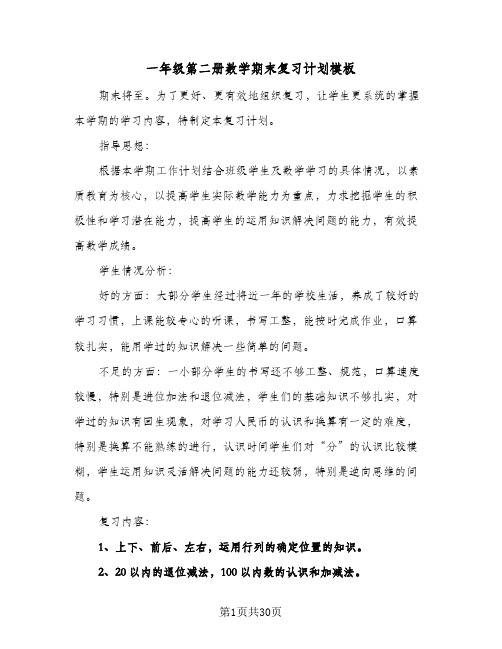
一年级第二册数学期末复习计划模板期末将至。
为了更好、更有效地组织复习,让学生更系统的掌握本学期的学习内容,特制定本复习计划。
指导思想:根据本学期工作计划结合班级学生及数学学习的具体情况,以素质教育为核心,以提高学生实际数学能力为重点,力求挖掘学生的积极性和学习潜在能力,提高学生的运用知识解决问题的能力,有效提高数学成绩。
学生情况分析:好的方面:大部分学生经过将近一年的学校生活,养成了较好的学习习惯,上课能较专心的听课,书写工整,能按时完成作业,口算较扎实,能用学过的知识解决一些简单的问题。
不足的方面:一小部分学生的书写还不够工整、规范,口算速度较慢,特别是进位加法和退位减法,学生们的基础知识不够扎实,对学过的知识有回生现象,对学习人民币的认识和换算有一定的难度,特别是换算不能熟练的进行,认识时间学生们对“分”的认识比较模糊,学生运用知识灵活解决问题的能力还较弱,特别是逆向思维的问题。
复习内容:1、上下、前后、左右,运用行列的确定位置的知识。
2、20以内的退位减法,100以内数的认识和加减法。
3、认识人民币、认识时间。
4、找规律、统计。
5、解决问题。
复习要求:1、学生能掌握上下、前后、左右的知识,能根据行列的确的定物体的具体位置。
2、学生能熟练的数100以内数,会写100以内数,掌握100以内数的组成,会比较大小。
3、学生能较熟练地计算20以内的退位减法,会计算100以内两位数加、减一位数和整十数。
4、能认识人民币的单位元、角、分,能进行人民币的简单换算。
5、学生会读、写几时几分,熟练掌握1时=____分。
6、会用简单的方法收集、整理数据,初步认识条形统计图和统计表,能根据统计表的数据提出并回答简单的问题。
7、能用所学的知识解决简单的问题。
复习措施:1、结合学生生活实际,利用教室里的有效资源,让学生准确地描述出自己所处的位置,各种物体的位置,特别强调“左、右”的相对性问题。
2、100以内数的复习:引导学生通过观察数位表,了解数的组成和比较数的大小。
人教版语文第二册期末复习资料
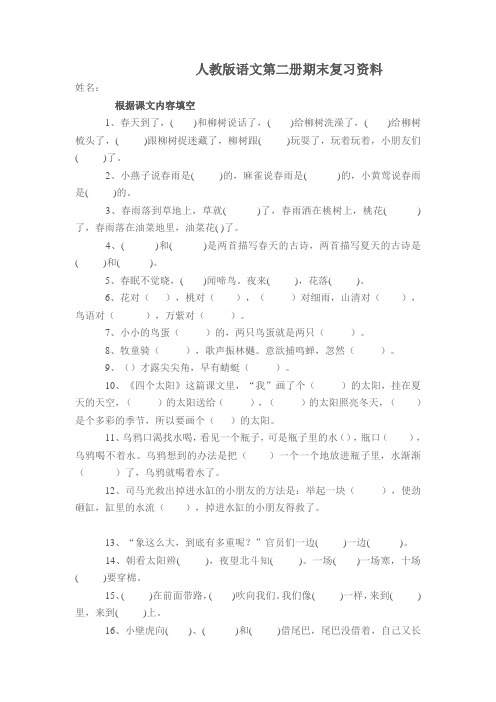
人教版语文第二册期末复习资料姓名:根据课文内容填空1、春天到了,( )和柳树说话了,( )给柳树洗澡了,( )给柳树梳头了,( )跟柳树捉迷藏了,柳树跟( )玩耍了,玩着玩着,小朋友们( )了。
2、小燕子说春雨是( )的,麻雀说春雨是( )的,小黄莺说春雨是( )的。
3、春雨落到草地上,草就( )了,春雨洒在桃树上,桃花( )了,春雨落在油菜地里,油菜花( )了。
4、( )和( )是两首描写春天的古诗,两首描写夏天的古诗是( )和( )。
5、春眠不觉晓,( )闻啼鸟。
夜来( ),花落( )。
6、花对(),桃对(),()对细雨,山清对(),鸟语对(),万紫对()。
7、小小的鸟蛋()的,两只鸟蛋就是两只()。
8、牧童骑(),歌声振林樾。
意欲捕鸣蝉,忽然()。
9、()才露尖尖角,早有蜻蜓()。
10、《四个太阳》这篇课文里,“我”画了个()的太阳,挂在夏天的天空,()的太阳送给(),()的太阳照亮冬天,()是个多彩的季节,所以要画个()的太阳。
11、乌鸦口渴找水喝,看见一个瓶子,可是瓶子里的水(),瓶口(),乌鸦喝不着水。
乌鸦想到的办法是把()一个一个地放进瓶子里,水渐渐()了,乌鸦就喝着水了。
12、司马光救出掉进水缸的小朋友的方法是:举起一块(),使劲砸缸,缸里的水流(),掉进水缸的小朋友得救了。
13、“象这么大,到底有多重呢?”官员们一边( )一边( )。
14、朝看太阳辨( ),夜望北斗知( )。
一场( )一场寒,十场( )要穿棉。
15、( )在前面带路,( )吹向我们。
我们像( )一样,来到( )里,来到( )上。
16、小壁虎向( )、( )和( )借尾巴,尾巴没借着,自己又长出了一条( )。
17、地球爷爷的手其实就是( )。
18、小蝌蚪的妈妈是( )。
19、荷叶( )的,( )的。
将独体字合成合体字:(先连线,再将合起来的字写在括号里)1 父人女虫禾立王马日巴义里()()()()()()2 口田今木人门那力对云心日()()()()()()3 日木女王日元且九生月()()()()()4 相走虫土禾干心也火马()()()()()5 音门口禾日山女昌夕乃口也心十()()()()()()()。
六年制第二册期末复习同步自测(人教版,新课标)
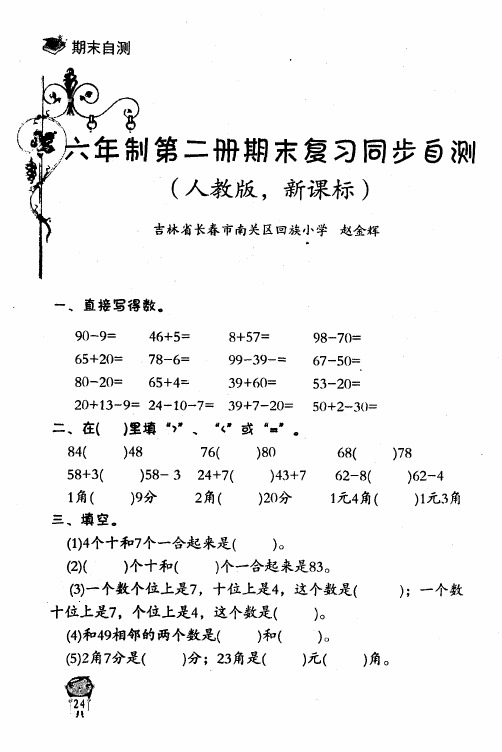
J 第二册 期 末复 习 同步 西测
( 教 版 ,新 课 标 ) 人
吉林 省长春 市南关区回族小学 赵金 辉
一
、
直接写得教。
9 0-9= 46 = +5 8+5 7=
9 8-7 0=
6 +2 = 5 0
8 0-2 0=
7 -6 8 =
65 +4=
9 -3 -= 9 9
3 9+6 0=
6 7-5 = 0
5 3-2 = 0
2 0+1 3-9= 2 4-1 0-7= 3 9+7 0= -2
5 0+2-3 = O
二、在( ) 里填 。’、 。’虫 。 。 ’ ‘
8( 4 5+ ( 8 3 )8 4 7( 6 )0 8 )3 7 4+
)4 。 5
),5 。 O
六 、 应 用题 .
( )商店里有1 个红气球 ,8 1 0 个黄 气球 ,共有 多少个 气球?
口 。口 =口 c 个
答 :一共有
— —
个 气球 ?
( ) 2 上级发给学校2 箱图书,借去 了2 箱 ,还剩 多少箱? 5 0
口 。口=口 c 箱
答 :还 剩 七、填 一填 。 箱?
( )王奶奶 的岁数比6 大 ,比7 小,王奶奶 可能是 ( 1 5 0
) , 岁
或者是 (
)岁、 (
)岁、 (
)岁。
( 2)小丽7 岁生 日晚会 上 ,点 了7 根蜡 烛 ,后 来一 口气吹 灭 了5
根 ,还剩下 ( )根蜡 烛。
酊 开 一1 j 守约 稍  ̄ / f 舌。— — 匕尔 私 克 it , tl .
) 个一合起 来是8 。 3
人教版小学一年级第二册语文复习题

人教版语文第二册期末复习资料(一)姓名:一、多音字选字填空1.行:①xíng ②háng(1)穿过人行( )道,就是中国银行( )。
(2)因为下雨,路上的行( )人少了。
(3)道路的两旁各有一行( )小树。
2.处: ①chǔ②chù(1)一只乌鸦口渴了,到处()找水喝。
(2)小朋友要友好相处( )。
(3)这件事该怎么处( )理呢?(4)这张考卷有五处( )错误。
3.着:①zháo ②zhe(1)瓶子里的水渐渐升高,乌鸦喝着( )水了。
(2)小明安静地躺着( ),睡着( )了。
(3)爸爸乘坐的班机准时着( )陆了。
4.得:①de ②děi ③dé(1)要取得( )好成绩,我得( )努力学习。
(2)下课时,小强跑得( )太快跌倒了。
(3)小红得( )到了五颗红星。
5.地:①dì②de(1)马儿飞快地( )奔跑在草地( )上。
(2)值日生在认真地()扫地( )。
6.没:①méi ②mò(1)王二小没( )有真的听从敌人的话,而是把敌人带进了埋伏圈。
(2)有一艘巨轮在大海里沉没( )了。
7.扫:①sǎo ②sào(1)一下课,小红就拿起扫( )帚扫( )地,扫( )完地又把扫( )把放整齐。
(2)小林每天都帮奶奶打扫( )卫生。
8.长:①cháng ②zhǎng(1)不久,小壁虎又长( )出了长长( )的尾巴。
(2)小洋常常长( )跑,所以长( )得特别健壮。
9朝:①cháo ②zhāo(1)一大早,我们面朝( )东方看朝( )阳。
(2)李白是唐朝( )的伟大诗人。
(3)同学们朝( )夕相处,十分友爱。
10.干:①gān ②gàn(1)农民伯伯在田里干( )活。
(2)打扫过的教室又变得干( )净了。
(3)妈妈晾在窗外的衣服已经干( )了。
11.难:①nán ②nàn(1)这道题一点儿也不难( )。
2021-2022学年高中地理人教版(2019)必修第二册期末复习复习卷 第一章 人口

2021-2022学年高中地理人教版(2019)必修第二册期末复习通关检测第一章人口下图是四个国家人口密度分布模式图。
读图,完成1—2题。
1.图中①②③④代表的国家依次是( )A.德国、澳大利亚、美国、印度B.美国、印度、德国、澳大利亚C.澳大利亚、印度、美国、德国D.澳大利亚、德国、美国、印度2.下列关于上述四国人口密度分布特征的叙述,正确的是( )A.①国中部、西部海拔高,气候寒冷,人口稀少B.②国人口最密集区的分布与该国工业分布一致C.③国西部深居内陆,气候干旱,人口稀少D.④国中南部地势低平,气候湿热,人口稀少结合下表并结合所学知识,完成3—4题。
黑河—腾冲一线东西部地区比较表地区面积比例人口比例人口密度/ (人•km-2)东部地区46% 96% 222西部地区54% 4% 93.对我国人口分布格局起决定性作用的因素是( )A.地形和气候B.土壤和植被C.水文和农业D.历史和经济4.西北地区总体人口稀少,但局部地区人口分布较集中,此类地区大多( )A.海拔较高,气候凉爽B.地处山麓,临近河流C.矿产丰富,工业发达D.平原广阔,土壤肥沃人类诞生以来,经过漫长的繁衍与迁徙,如今分布在地球上除南极洲以外的各大陆上。
各地自然条件和人文条件存在很大差异,世界人口的分布极为不均。
据此完成5—7题。
5.下列各纬度带人口数量最多的是( )A.40°N—60° NB.20° N—60° NC.0°—20° ND.0°—20° S6.北半球温带地区比南半球温带地区人口数量多,主要原因是( )A.北半球温带地区温度和降水适宜B.南半球温带地区地势起伏大C.北半球温带地区比南半球温带地区陆地面积大D.北半球温带地区开发早7.干旱地区人口分布多呈点状、线状分布的原因是( )A.地形的影响B.水源的影响C.政策的影响D.文化背景的影响近年来,我国流动人口数量一直维持在2亿以上,且持续增长,城乡间人口流动是主要的流动形式。
古代汉语第二册期末复习题
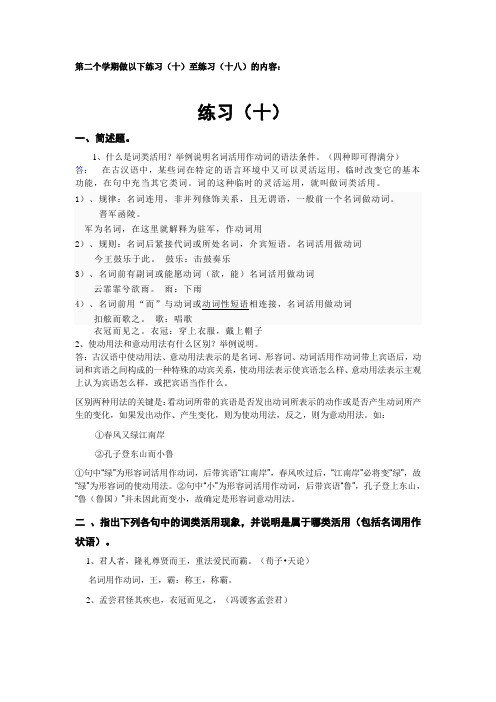
第二个学期做以下练习(十)至练习(十八)的内容:练习(十)一、简述题。
1、什么是词类活用?举例说明名词活用作动词的语法条件。
(四种即可得满分)答:在古汉语中,某些词在特定的语言环境中又可以灵活运用,临时改变它的基本功能,在句中充当其它类词。
词的这种临时的灵活运用,就叫做词类活用。
1)、规律:名词连用,非并列修饰关系,且无谓语,一般前一个名词做动词。
晋军函陵。
军为名词,在这里就解释为驻军,作动词用2)、规则:名词后紧接代词或所处名词,介宾短语。
名词活用做动词今王鼓乐于此。
鼓乐:击鼓奏乐3)、名词前有副词或能愿动词(欲,能)名词活用做动词云霏霏兮欲雨。
雨:下雨4)、名词前用“而”与动词或动词性短语相连接,名词活用做动词扣舷而歌之。
歌:唱歌衣冠而见之。
衣冠:穿上衣服,戴上帽子2、使动用法和意动用法有什么区别?举例说明。
答:古汉语中使动用法、意动用法表示的是名词、形容词、动词活用作动词带上宾语后,动词和宾语之间构成的一种特殊的动宾关系,使动用法表示使宾语怎么样、意动用法表示主观上认为宾语怎么样,或把宾语当作什么。
区别两种用法的关键是:看动词所带的宾语是否发出动词所表示的动作或是否产生动词所产生的变化,如果发出动作、产生变化,则为使动用法,反之,则为意动用法。
如:①春风又绿江南岸②孔子登东山而小鲁①句中“绿”为形容词活用作动词,后带宾语“江南岸”,春风吹过后,“江南岸”必将变“绿”,故“绿”为形容词的使动用法。
②句中“小”为形容词活用作动词,后带宾语“鲁”,孔子登上东山,“鲁(鲁国)”并未因此而变小,故确定是形容词意动用法。
二、指出下列各句中的词类活用现象,并说明是属于哪类活用(包括名词用作状语)。
1、君人者,隆礼尊贤而王,重法爱民而霸。
(荀子•天论)名词用作动词,王,霸:称王,称霸。
2、孟尝君怪其疾也,衣冠而见之,(冯谖客孟尝君)名词用作动词,穿好衣服。
3、齐将田忌善而客待之。
(史记•孙子吴起列传)名词用作状语,客,当客人对待。
大学英语(二) 复习题答案
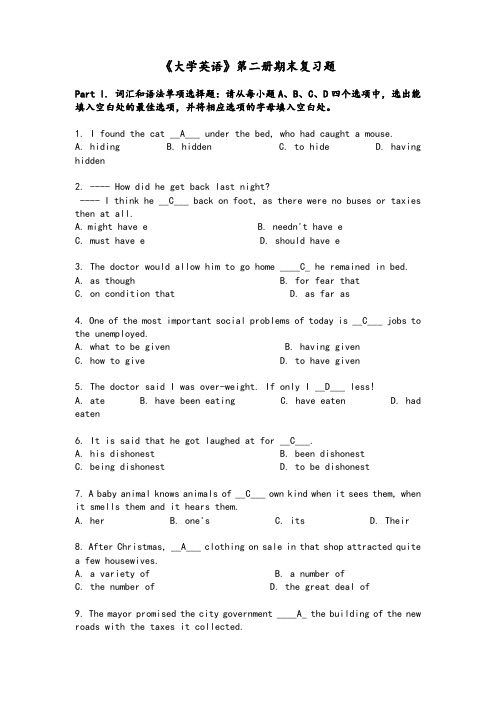
《大学英语》第二册期末复习题Part I. 词汇和语法单项选择题:请从每小题A、B、C、D四个选项中,选出能填入空白处的最佳选项,并将相应选项的字母填入空白处。
1. I found the cat __A___ under the bed, who had caught a mouse.A. hidingB. hiddenC. to hideD. having hidden2. ---- How did he get back last night?---- I think he __C___ back on foot, as there were no buses or taxies then at all.A.might have eB. needn't have eC. must have eD. should have e3. The doctor would allow him to go home ____C_ he remained in bed.A. as thoughB. for fear thatC. on condition thatD. as far as4. One of the most important social problems of today is __C___ jobs to the unemployed.A. what to be givenB. having givenC. how to giveD. to have given5. The doctor said I was over-weight. If only I __D___ less!A. ateB. have been eatingC. have eatenD. had eaten6. It is said that he got laughed at for __C___.A. his dishonestB. been dishonestC. being dishonestD. to be dishonest7. A baby animal knows animals of __C___ own kind when it sees them, when it smells them and it hears them.A. herB. one'sC. itsD. Their8. After Christmas, __A___ clothing on sale in that shop attracted quitea few housewives.A. a variety ofB. a number ofC. the number ofD. the great deal of9. The mayor promised the city government ____A_ the building of the new roads with the taxes it collected.A. shall financeB. may supportC. can helpD. should provide10. Whoever does wrong to his country or to the people deserves ___B__.A. to punishB. to be punishedC. to punishmentD. of being punished11. Some children usually behave in their own way _C____ they do not get along with their classmates and there are often disagreements between them.A. even thoughB. on condition thatC. so thatD. unless12. Secondary and higher education ____C_ available to all high school graduates in this country so far.A. have madeB. were made themselvesC. have been madeD. were made it13. The mother believes that John's stupid, but it's different _B____ of Mary; she's just lazy.A. in spiteB. in the caseC. in the courseD. in case14. About how many elements __C___ make up most of the substances we meet in everyday life?A. it is whichB. what it isC. is it thatD. it is that15. The government was believed to be considering _D____ a law _____ ita crime to import any kind of weapon.A. to pass …. to makingB. to be passing …. to makeC. passing … madeD. passing …. making16.Dewitt Wallance founded the Reader's Digest as a pocket-sized, non-fiction magazine__D___ to inform and entertain.A.was intendedB. intendingC. to intendD. intended17. ____B_ this instrument should have put its work permit number on the box.A. Who checkedB. Whoever inspectedC. No matter who examinedD. Those who estimates18.I went to __B__ to buy a ruler and a rubber.A. a stationerB. a stationer'sC. the stationerD. stationer's19. Two of the notebooks __B__ Tom had lost on the bus were returned to the main desk at his dormitory.A. whatB. whichC. whoD. whose20. The drink tastes a little _A___ to me.A. strongB. stronglyC. so strongD. too much strong21. My roommate lost a lot of weight _D___ every day.A. to exerciseB. with exerciseC. for exerciseD. by exercising22. They arrived there at last, __B_.A. was tired and hungryB. being tired and hungryC. tired and hungryD. tiredly and hungrily23. ------ What was the party like?------Wonderful . It's years __D__ I enjoyed myself so much.A.beforeB. afterC. whenD. since24. Time should be made a good use _A___ our lessons well.A. of to learnB. of learningC. to learnD. to learning25.You cannot be __C__ careful when you drive a car.A. veryB. soC. tooD. Enough26. When he arrived, he found __B__ the aged and the sick at home.A. nothing butB. none butC. none other thanD. no other than27. John seems a nice person. __B__, I don't trust him.A. Even thoughB. Even soC. ThereforeD. Though28. Excuse me. If your call's not too urgent, do you mind __B__ mine first?A. I makeB. if I makeC. me to makeD. that I make29. We agreed to accept _D___ they thought was the best tourist guide.A. whateverB. whomeverC. whicheverD. Whoever30. __D__ she realized it was too late to go home.A. No sooner it grew dark thanB. Hardly did it grow dark thatC. Scarcely had it grown dark thanD. It was not until dark that31. They are going to have the serviceman __A__ an electric fan in the office tomorrow.A. installB. to installC. to be installedD. installed32.There is an increase of 16% in the consumption of tobacco__B___ the previous year.A. overB. thanC. toD. then33.___A___ on time, I think, the medicine will work on him before long.A. TakenB. Being takenC. If takingD. Take34.__D___ you want me to fire you, I suggest you stop wearing sports clothes at office.A. As long asB. As far asC. SinceD. Unless35.Nobody in the class except you and me __A___ to the principal about the air quality problems.A. has plainedB. have plainedC. plainD. plaining36.------Why can't you smoke?------ At no time ____C___ in the meeting room.A. does smoking permitB. smoking be permittedC. is smoking permittedD. permits smoking37. The sale usually takes place outside the house, with the audience _D__on benches, chairs or boxes.A.having seatedB. seatingC. having been seatedD. seated38. These winners from that key school are wise and diligent, actually there are___A___students in that schoolA. many suchB. such manyC. so manyD. so much39. Jack got a good mark although he had done __A___ the others.A. half as much asB. as much as halfC. as half asD. as much half as40. -----What happened to Bill?-----He ___B__ really fast when suddenly he ran headfirst into a parked car.A.had runB. was runningC. has runD. has been running41. -----How was your holiday?-----It couldn’t have been ___B__. I just stayed in the hotel because it was raining most of the time.A.boringB. more boringC. most boringD. less boring42. Thank you so much! But for your text message, I _A____ home without my ID card this morning.A. would have leftB. would leaveC. had leftD. Left43. -----Do we have to wear our school uniforms tomorrow?-----I think so. We ____A_ the ing-of-age ceremony in the afternoon.A.will be attendingB. have attendedC. attendD. attended44. In English class, our teacher often creates an environment ___C__ we are given the opportunity to solve problems ourselves.A. whenB. whichC. whereD. that45. Some seemingly harmless blogs might bee harmful when __D___ on the Internet by millions of people.A. to readB. readingC. readD. being read46. Friends are angels who lift us to our feet ___D__ our wings have trouble remembering how to fly.A.unlessB. becauseC. thoughD. when47. Jonny, I can’t believe how much you have changed! You _C____ at least one foot!A. growB. grewC. have grownD. are growing48. ----- I’m going to have lunch. Do you mind talking about your plan __A__ lunch?-----All right. I’ll wait here in the office.A. afterB. beforeC. overD. until49. -----The weatherman on the news said it might rain later on this afternoon.-----Well, I _ D___ take my umbrella along with me today.A. canB. mayC. couldD. must50. -----You seem busy these days.-----Yes, I’m looking for a house. It’s really not easy to find __B___ with a garden.A. thisB. oneC. itD. that51. Although the Eiffel Tower ___D__ to last for 20 years, it is still standing today.A. has designedB. had designedC. is designedD. was designed52. Shooting, as __ A__ means of survival originally, developed into _____ sport only in the late 19th century.A. a; aB. the; theC. a; theD. the; a53. __C____ the housing price, several measures have been adopted in the last two years.A. LoweringB. Having loweredC. To lowerD. To have lowered54. These two areas are similar ____C_ they both have a high rainfall during this season.A. to thatB. beside thatC. in thatD. except that55. She is always ready to help people in trouble because she thinks ita ___D__.A. decisionB. chanceC. prideD. pleasure56. On New Year’s Eve, New York City holds an outdoor _B____ which attractsa crowd of a million or more people.A. incidentB. eventC. caseD. affair57. I went to bed very late that night, __C___, early the next morning.A. at leastB. in a wordC. or ratherD. at most58. --- The secretary wrote ___ D__ note to the manager.--- I guess she forgot writing one.A. the otherB. oneC. one moreD. another59. Some trees are cut down each year and __ A___ are left to grow even taller.A. the restB. a restC. rest of themD. a rest of them60. I don’t like this pair of gloves. Will you show me _ C____.A. anotherB. the othersC. some othersD. other ones61. Our parents will show us a film projector for our party. Let’s sit _C____ the table and have a look.A. onB. nearC. roundD. over62. --- Your ___ C__, please!--- Why don’t you ring and ask Mr. King inside the hall? It was he who asked me to e to the party.A. foodB. moneyC. invitationD. suggestion63. The idea of fighting a noise ___ C__ making more noises sounds strange, but that’s _____ what we are doing now.A. with; justB. through; veryC. by; exactlyD. for; indeed64. I’m sure ghosts do not exist. __ D___ I have never seen one.A. First of allB. Now and thenC. Day and nightD. At least65. We held a football match _ C____ Class 1 and Class 5 last semester.A. withB. amongC. betweenD. by66. Three ___C__ four people believe that having healthy teeth is very important.A. byB. fromC. out ofD. of67. It is the prevention of disease __A___ its successful treatment that has led to the rapid increase of the world’s population.A. rather thanB. includingC. but alsoD. less than68. Don’t put the chair too close to the stove. Dry wood _D____ fire easily, you know.A. lightsB. burnsC. makesD. catches69. --- Could you mail these letters for me please?--- ___C__ letters? Your friends are going to be very happy to hear from you again.A. WhatB. SomeC. MoreD. Different70. The police came and they soon got the situation well ___B__.A. by handB. in handC. on handD. with hand71. The __ A___ you draw, _____ the picture will be.A. more carefully, the more beautifulB. more carefully, the more niceC. more careful, more beautifulD. much more careful, more beautiful72. The young man ___C__ the cage first.A. told to cleanB. will tell to be cleanedC. was told to cleanD. is told to cleaning73. My television is broken again, it needs _B____.A. to repairedB. to be repairedC. being repairedD. repairs74.---What’s your father like? And how is he?--- C .A. He likes reading books, and he’s fine.B. He’s a worker, and he’s well.C. He’s tall and fineD. He likes sports and he’s strong75. Of the three foreigners, one is from London, _ B____ are from Paris.A. another twoB. the other twoC. the others twoD. others two76.___A__ do you know is the population of Canada?A. WhatB. WhichC. How manyD. How much77. Mary has a nice watch and she __A___ it everyday.A. wearsB. dressesC. put onD. has78. The population of our city is ___B__ that of theirs.A. more thanB. as large asC. as many asD. less than79. Newly-born babies _ B__in hospital.A. are taken good care B.are taken good care ofC. take good care of D.take good care80. We’ve bought ___ D__ desks for the children there, and _____ these children are new.A. several hundreds of, two hundreds ofB. many hundreds of, two hundred ofC. several hundred, two hundreds ofD. hundreds of, two hundred81.------Are the two answers right?-------No, _C____ right.A. no one isB. none isC. neither isD. either is not82. “He is sure that he can pass the exam” means “__ B___”.A. He is sure to pass the examB. He is sure of passing the examC. It is sure for him to pass the examD. It is sure that he can pass the exam.83. I ___ A__ a cold for a week, that makes me _____ all day.A. have caught ,unhappyB. have had, unhappilyC. caught, unhappyD. have got, happy84. They all felt __A___ not very difficult to learn the passage by heart.A. itB. thatC. thisD. themselves85. One swallow can never __B___ a summer.A. haveB. makeC. beeD. turn86.-----There’s only one ticket for us two. (D)----- _ ____ you _____ I can’t go to the cinema?A. Both ;andB. Neither; norC. Not; orD. Either; or87. He knows a lot about puters __ C___ he looks like a child of ten.A. andB. butC. thoughD. because88. Nobody but my parents _ B____ the secret.A. knowB. knowsC. have knowD. is known89. The Olympic Games __ A___ held every _____ years.A. is, fourB. are, fourC. is ,fiveD. / , five90. Li Ming’s handwriting is better than __ A___ in his class.A. anyone else’sB. anyone’s else’sC. anyone’sD. anyone elsePart II. 阅读理解题:请阅读以下六篇文章,然后从每道题的四个选项中选择出最适合的那个选项,将其相应的字母填写到空白处。
一年级语文第二册期末总复习
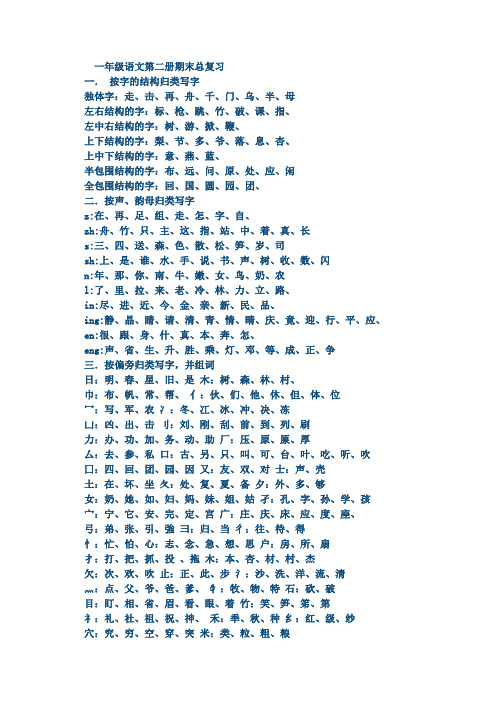
一年级语文第二册期末总复习一.按字的结构归类写字独体字:走、击、再、舟、千、门、乌、半、母左右结构的字:标、枪、跳、竹、破、课、指、左中右结构的字:树、游、掀、鞭、上下结构的字:梨、节、多、爷、落、息、杏、上中下结构的字:意、燕、蓝、半包围结构的字:布、远、问、原、处、应、闲全包围结构的字:回、国、圆、园、团、二.按声、韵母归类写字z:在、再、足、组、走、怎、字、自、zh:舟、竹、只、主、这、指、站、中、着、真、长s:三、四、送、森、色、散、松、笋、岁、司sh:上、是、谁、水、手、说、书、声、树、收、数、闪n:年、那、你、南、牛、嫩、女、鸟、奶、农l:了、里、拉、来、老、冷、林、力、立、路、in:尽、进、近、今、金、亲、新、民、品、ing:静、晶、睛、请、清、青、情、晴、庆、竟、迎、行、平、应、en:很、跟、身、什、真、本、奔、怎、eng:声、省、生、升、胜、乘、灯、邓、等、成、正、争三.按偏旁归类写字,并组词日:明、春、星、旧、是木:树、森、林、村、巾:布、帆、常、帮、亻:伙、们、他、休、但、体、位冖:写、军、农冫:冬、冮、冰、冲、决、冻凵:凶、出、击刂:刘、刚、刮、前、到、列、刷力:办、功、加、务、动、助厂:压、原、厡、厚厶:去、参、私口:古、另、只、叫、可、台、叶、吃、听、吹囗:四、回、团、园、因又:友、双、对士:声、壳土:在、坏、坐夂:处、复、夏、备夕:外、多、够女:奶、她、如、妇、妈、妹、姐、姑孑:孔、字、孙、学、孩宀:宁、它、安、完、定、宫广:庄、庆、床、应、度、座、弓:弟、张、引、強彐:归、当彳:往、待、得忄:忙、怕、心:志、念、急、想、思户:房、所、扇扌:打、把、抓、投、拖木:本、杏、材、村、杰欠:次、欢、吹止:正、此、步氵:沙、洗、洋、流、清灬:点、父、爷、爸、爹、牜:牧、物、特石:砍、破目:盯、相、省、眉、看、眼、着竹:笑、笋、笫、第礻:礼、社、祖、祝、神、禾:秊、秋、种纟:红、级、纱穴:究、穷、空、穿、突米:类、粒、粗、粮艹:艺、节、花、苞足:趴、跃、跑、跟、踢、蹆讠:计、认、让、讲、许、课走:赶、起、越辶:边、达、过、运、近、进、远、送虫:蚁、蚂、蛙阝:队、阳、阴、除、阵、邓、郎、部、都钅:钉、钟、铅、铁、门:闪、闭、问、闲、雨、雪、雷、页:顶、领、顺、颗饣:饥、饿马:驰、驾、骂鸟:鸡、鸣、鸦、鸭、鹅四.反义词高()问()黑()送()哭()无()静()主()紧()来()多()今()近()进()新()甜()后()弯()满()早()坐()丑()推()热()阴()双()假()紧()忙()死()五.近义词奔()迎()等()喊()五彩()盛开()欢乐()喜爱()宁静()响亮()清晨()得意()特别()周围()惭愧()经常()看望()故乡()应该()辛劳()六.照样子写词跑得快跳得高看得远做得对一片片一只只一个个一群群绿油油白花花亮晶晶黄澄澄高高兴兴欢欢喜喜大大方方雪白雪白鲜红鲜红碧绿碧绿又大又圆又白又胖又黑又瘦一上一下一前一后一高一低千山万水千辛万苦千军万马自娱自乐自作自受自高自大七.同音字组词布()比()池()声()再()步()笔()驰()生()在()和()洋()孩()元()园()河()阳()还()圆()原()木()工()公()只()玩()牧()功()宫()指()完()进()金()夜()晴()清()近()今()叶()情()青()节()为()辛()力()半()洁()位()新()立()办()雨()每()由()后()可()语()美()油()候()渴()火()是()坐()带()乎()伙()世()座()代()呼()飞()动()网()话()向()非()洞()往()华()象()叫()下()鱼()留()与()觉()夏()于()流()羽()八.形近字组词村()击()驰()破()处()树()出()地()波()外()笑()次()元()观()功()跃()欢()无()现()动()孩()给()远()近()字()该()答()玩()听()学()原()住()渴()为()你()泉()往()喝()办()称()问()午()板()拍()金()间()牛()饭()怕()全()火()同()巴()课()妈()伙()洞()把()颗()蚂()花()故()会()晴()乌()华()做()运()睛()鸟()九.多音字组词长cháng_____ 发fā______ 得de_____ 地de______zhăng_____ fà______ dã______ dì______只zhī______ 好hǎo______为wãi______ 华huá_______ zhǐ_______ hào______ wâi_______ huà_______ 十.填词1.一只只()一片片()一个个()一头头()一群群()一朵朵()一条条()一次次()一把把()一座座()一匹匹()一首首()一颗颗()一棵棵()一张张()一阵阵()2.一()石头一()牛一()马一()山一()燕子一()河一()雨一()星一()池塘一()气一()船一()水一()好字一()球一()云一()鹅一()世界一()花一()树一()羊一()春雷一()猪一()钟一()笔一()蘑菇一()白发一()石头一()缸一()骑手一()衣服一()木棍一()伞一()电脑一()乌鸦一()眼睛一()鸟一()洞眼一()蚂蚁一()蝈蝈一()山一()口袋一()肥料一()年纪一()手3.()的娃娃()的外衣()的眼睛()的睫毛()的气球()的珍珠()的池塘()的眼睛()的世界()的小船()的梅花()的海洋()的草原()的羊群()的歌声()的蘑菇()的掌声()的技艺()的骑手()的公牛()的地方()的白发()的爸爸()的小草()的蜜蜂()的春风()的小花()的叶子()的蝈蝈()的嘴巴()的身体()的运动()的天空()的树木()的小河()的星星十一.填写词语()()雷动载()载()春暖()()()()若狂愚()移()精卫()()()()辉煌百折()()勇往()()()()明媚春色()()痛痒()()()()盎然骨肉()()恩重()()()()成阴()深似()温故()()()()根深()浅()深循序()()()()遍野()积()累防患()()()()远虑()长()久临危()()()()无患从容()()多谋()()()()近忧()()大乱一不()()()()大汗自()自()自()自()十二.整理、排列句子,并加标点1.高高兴兴我小明去和踢球2.中国在出现足球最早3.铅笔盒吗是我送给的4.每天在家功课都复习小红5.二年级我就是下学期了学生的6.一起爸爸我和去玩公园7.能借给这本书看看我吗8.真热今天啊的天气十三.补充句子,并加标点。
2024年一年级第二册数学期末复习计划(3篇)

2024年一年级第二册数学期末复习计划____年一年级第二册数学期末复习计划为了帮助你高效地复习数学,我给出了一个详细的复习计划。
这个计划将帮助你全面复习数学的各个章节,并为你留出了一些时间来做练习题和解答问题。
请确保按照计划,合理安排时间,并跟上复习进度。
第一周:整数1. 复习整数的定义和性质。
2. 复习整数的四则运算(加法、减法、乘法、除法)。
3. 解决一些涉及整数的实际问题。
第二周:小数1. 复习小数的定义和基本性质。
2. 复习小数的四则运算(加法、减法、乘法、除法)。
3. 解决一些涉及小数的实际问题。
第三周:分数1. 复习分数的定义和基本性质。
2. 复习分数的四则运算(加法、减法、乘法、除法)。
3. 解决一些涉及分数的实际问题。
第四周:几何1. 复习几何图形的基本概念(点、线、面)。
2. 复习平面图形的性质和分类(三角形、四边形、圆)。
3. 复习解决几何问题的方法和技巧。
第五周:面积和体积1. 复习计算平面图形的面积(三角形、四边形、圆)。
2. 复习计算立体图形的表面积和体积(立方体、长方体、圆柱体)。
3. 解决一些涉及面积和体积的实际问题。
第六周:数据统计1. 复习数据的收集和整理。
2. 复习数据的表示和分析(统计图表)。
3. 解决一些涉及数据统计的实际问题。
4. 复习概率的基本概念和计算方法。
第七周:复习和总结1. 复习前几周学过的知识点。
2. 解答过去几周的练习题和问题。
3. 总结数学的重要概念和方法。
备注:1. 每天复习时间安排为1-2小时,根据个人情况有所调整。
2. 每周的复习计划可以根据个人的实际情况进行灵活调整。
3. 每个章节的复习可以参考教材中的例题和习题。
4. 在复习过程中,如遇到不理解的问题,可以向老师或同学寻求帮助。
希望这个复习计划能对你有所帮助,并希望你能够取得优异的成绩!加油!2024年一年级第二册数学期末复习计划(2)一、整体复习安排1. 复习时间:根据个人情况,合理安排每天的复习时间,可以选择在下午或晚上进行集中复习。
(完整版)高英第二册期末复习资料吐血整理(2469课修辞句子解释句子翻译课文翻译)
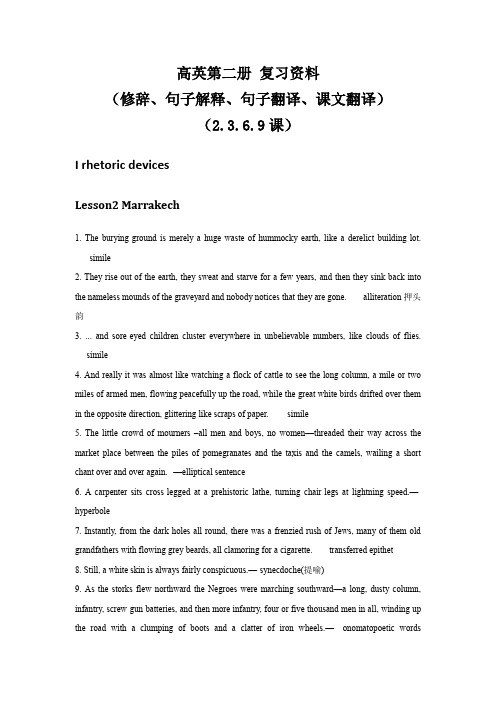
高英第二册复习资料(修辞、句子解释、句子翻译、课文翻译)(2.3.6.9课)I rhetoric devicesLesson2 Marrakech1. The burying-ground is merely a huge waste of hummocky earth, like a derelict building-lot. -----simile2. They rise out of the earth, they sweat and starve for a few years, and then they sink back into the nameless mounds of the graveyard and nobody notices that they are gone. -----alliteration押头韵3. ... and sore-eyed children cluster everywhere in unbelievable numbers, like clouds of flies. ----simile4. And really it was almost like watching a flock of cattle to see the long column, a mile or two miles of armed men, flowing peacefully up the road, while the great white birds drifted over them in the opposite direction, glittering like scraps of paper. ----- simile5. The little crowd of mourners –all men and boys, no women—threaded their way across the market place between the piles of pomegranates and the taxis and the camels, wailing a short chant over and over again.--—elliptical sentence6. A carpenter sits cross-legged at a prehistoric lathe, turning chair-legs at lightning speed.—-hyperbole7. Instantly, from the dark holes all round, there was a frenzied rush of Jews, many of them old grandfathers with flowing grey beards, all clamoring for a cigarette. -----transferred epithet8. Still, a white skin is always fairly conspicuous.—-synecdoche(提喻)9. As the storks flew northward the Negroes were marching southward—a long, dusty column, infantry, screw-gun batteries, and then more infantry, four or five thousand men in all, winding up the road with a clumping of boots and a clatter of iron wheels.—---onomatopoetic wordssymbolism10. Not hostile, not contemptuous, not sullen, not even inquisitive. —--elliptical sentence11. This wretched boy, who is a French citizen and has therefore been dragged from the forest to scrub floors and catch syphilis in garrison towns, actually has feelings of reverence before a white skin. —-synecdoche提喻Lesson3 inaugural address1. United, there is little we cannot do in a host of co-operative ventures. Divided, there is little we can do, for we dare not meet a power full challenge at odds and split asunder.—antithesis2.…in the past, those who foolishly sought power by riding the back of the tiger ended up inside.—metaphor3. Let us never negotiate out of fear, but let us never fear to negotiate.—regression (回环:A-B-C)4. All this will not be finished in the first one hundred days.—allusion 引典; climax递进5. And so, my fellow Americans ask not what your country can do for you; ask what you can do for your country.—antithesis, regression回环6 We observe today not a victory of party but a celebration of freedom, symbolizing an end as well as a beginning, signifying renewal as well as change. ----parallelism7. Let the word go forth from this time and place, to friend and foe alike….—alliteration8. Let every nation know, whether it wishes us well or i11, that we shall pay any price, bear any burden, meet any hardship, support any friend, oppose any foe to assure the survival and the success of liberty. ----–parallelism; alliteration9. United, there is little we cannot do in a host of co-operative ventures. Divided, there is little we can do, for we dare not meet a powerful challenge at odds and split asunder. ----antithesis对句10. To those peoples in the huts and villages of half the globe… ------11. …struggling to break the bonds of mass misery…----12. If a free society cannot help the many who are poor, it cannot save the few who are rich. -----antithesis13. … to assist free men and free governments in casting off the chains of poverty. ---repetition14. And if a beachhead of co-operation may push back the jungle of suspicion…-----metaphor15. Let both sides explore what problems unite us instead of belaboring those problems which divide us. -----antithesis16.And let every other power know that this hemisphere intends to remain the master of its own house. -----metaphor17. The energy, the faith, the devotion which we bring to this endeavor will light our country and all who serve it, and the glow from that fire can truly light the world. -----extended metaphor18. …to strengthen its shield of the new and the weak… ----metaphorWith a good conscience our only sure reward, with history the final judge of our deeds… -----parallelismLesson6 loving and hating New York1 A market for knowingness exists in New York that doesn’t exist for knowledge.—paregmenon2The condescending view from the fiftieth floor of the city’s crowds below cuts these people off from humanity.—transferred epithet3So much of well-to-do America now lives antiseptically in enclaves,tranquil and luxurious,that shut out the world.—synecdoche,metaphorLesson9 The loonsSimileGrandmother MacLeod, her delicately featured face as rigid as a cameo麦克里奥祖母那清秀的脸上此时显得像玉石雕像般的冷峻(Page194 Para12)At night the lake was like black glass with a streak of amber which was the path of the moon.夜间的湖面看起来像一块黑色玻璃,只有一线水面因映照着月光才呈现出琥珀色(Page198 Para39)The jukebox was booming like tuneful thunder电唱机播放出雷声般的音乐(Page199 Para48) MetaphorThrough the filigree of the spruce trees 透过一层云杉树叶织成的丝帘(page195 Para17)It seemed to me …daughter of the forest,a kind of junior prophetess of the wilds 在我看来,皮格特一定可以算是森林的女儿,是蛮荒世界的小预言家。
小学数学第二册期末复习卷

小学数学第二册期末复习卷班级 姓名 成绩一、计算。
(30分) 1、口算。
12-8= 68+7= 89+2= 53-10= 17+9=99-90= 71-6= 70+23= 43+8= 87-50= 30+45= 84-40= 47-9= 13+60= 40+14= 48-20= 78-20= 58+10= 80+12= 20+8=38-6= 78+8= 68-60= 53-3=2、70+5+10= 25-5-18= 54+3-5= 70-50+42= 二、填空(每空0.5分,共20分) 1、写作( ) 写作( ) 写作( ) 读作( ) 读作( ) 读作( ) 2、78里面有( )个十和( )个一。
3、92十位上的数是( ),表示( )个十,个位上的数是( ),表示( )个( )。
4、比69多20的数是( ),比69少20的数是( )。
5、最大的两位数是( ),最大的一位数是( ),最大的两位 数比最大的一位数多( )。
6、和79相邻的两个数是( )和( )。
7、(1)写出一个个位上是6的两位数。
( ) (2)写出一个个位上是0的两位数。
( ) (3)写出一个十位上是4的两位数。
( )(4)按照从小到大的顺序排列这三个数( )>( )>( )8、在○填上“<”、“>”、“=”。
87-30○87-3 52+40○52+4 9、找规律,接着写。
10、54角=( )元( )角 ;3元-1元5角=( )元( )角三、选择。
请将正确答案的序号填在括号里。
(10分) 1、下列数中,( )比76大,比79小。
①89 ②58 ③76 ④782、( )不是最大的两位数,但比96大,而且是双数。
①99 ②98 ③97 ④963、红花有89朵,黄花比红花少很多。
黄花可能有( )。
①88只 ②25只 ③90只4、同学们去浇树,六年级浇了30棵,三年级比六年级浇的少一些。
三年级可能植树( )。
①32棵 ②26棵 ③30棵5、2张1元,2张5角,5张1角组成( )。
高级英语2第二册第三版张汉熙期末复习资料
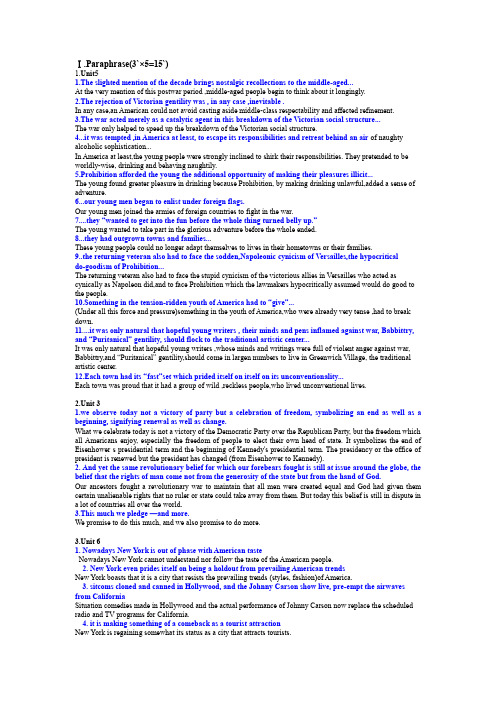
Ⅰ.Paraphrase(3`×5=15`)1.Unit51.The slighted mention of the decade brings nostalgic recollections to the middle-aged...At the very mention of this postwar period ,middle-aged people begin to think about it longingly.2.The rejection of Victorian gentility was , in any case ,inevitable .In any case,an American could not avoid casting aside middle-class respectability and affected refinement.3.The war acted merely as a catalytic agent in this breakdown of the Victorian social structure...The war only helped to speed up the breakdown of the Victorian social structure.4...it was tempted ,in America at least, to escape its responsibilities and retreat behind an air of naughty alcoholic sophistication...In America at least,the young people were strongly inclined to shirk their responsibilities. They pretended to be worldly-wise, drinking and behaving naughtily.5.Prohibition afforded the young the additional opportunity of making their pleasures illicit...The young found greater pleasure in drinking because Prohibition, by making drinking unlawful,added a sense of adventure.6...our young men began to enlist under foreign flags.Our young men joined the armies of foreign countries to fight in the war.7....they “wanted to get into the fun before the whole thing turned belly up.”The young wanted to take part in the glorious adventure before the whole ended.8...they had outgrown towns and families...These young people could no longer adapt themselves to lives in their hometowns or their families.9..the returning veteran also had to face the sodden,Napoleonic cynicism of Versailles,the hypocriticaldo-goodism of Prohibition...The returning veteran also had to face the stupid cynicism of the victorious allies in Versailles who acted as cynically as Napoleon did,and to face Prohibition which the lawmakers hypocritically assumed would do good to the people.10.Something in the tension-ridden youth of America had to “give”...(Under all this force and pressure)something in the youth of America,who were already very tense ,had to break down.11....it was only natural that hopeful young writers , their minds and pens inflamed against war, Babbittry, and “Puritanical” gentility, should flock to the traditional artistic center...It was only natural that hopeful young writers ,whose minds and writings were full of violent anger against war, Babbittry,and “Puritanical” gentility,should come in largen numbers to live in Greenwich Village, the traditional artistic center.12.Each town had its “fast”set which p rided itself on itself on its unconventionality...Each town was proud that it had a group of wild ,reckless people,who lived unconventional lives.2.Unit 31.we observe today not a victory of party but a celebration of freedom, symbolizing an end as well as a beginning, signifying renewal as well as change.What we celebrate today is not a victory of the Democratic Party over the Republican Party, but the freedom which all Americans enjoy, especially the freedom of people to elect their own head of state. It symbolizes the end of Eisenhower s presidential term and the beginning of Kennedy's presidential term. The presidency or the office of president is renewed but the president has changed (from Eisenhower to Kennedy).2. And yet the same revolutionary belief for which our forebears fought is still at issue around the globe, the belief that the rights of man come not from the generosity of the state but from the hand of God.Our ancestors fought a revolutionary war to maintain that all men were created equal and God had given them certain unalienable rights that no ruler or state could take away from them. But today this belief is still in dispute ina lot of countries all over the world.3.This much we pledge —and more.We promise to do this much, and we also promise to do more.3.Unit 61. Nowadays New York is out of phase with American tasteNowadays New York cannot understand nor follow the taste of the American people.2. New York even prides itself on being a holdout from prevailing American trendsNew York boasts that it is a city that resists the prevailing trends (styles, fashion)of America.3. sitcoms cloned and canned in Hollywood, and the Johnny Carson show live, pre-empt the airwaves from CaliforniaSituation comedies made in Hollywood and the actual performance of Johnny Carson now replace the scheduled radio and TV programs for California.4. it is making something of a comeback as a tourist attractionNew York is regaining somewhat its status as a city that attracts tourists.5. To win in New York is to be uneasyA person who wins in New York is constantly disturbed by fear and anxiety (because he is afraid of losing what he has won in the fierce competition).6. Nature’s pleasures are much qualified in New York.The chance to enjoy the pleasures of nature is very limited.7. the city’s bright glow arrogantly obscures the heavensAt night the city of New York is aglow with lights and seems proudly and haughtily to darken the night sky.8. But the purity of a bohemian dedication can be exaggerated.But a pure and wholehearted devotion to a Bohemian life style can be exaggerated.9. In both these roles it ratifies more than it creates.In both these roles of banking and communications head-quarters, New York starts or originates very few things but gives its stamp of approval to many things created by people in other parts of the country.10. The television generation grew up in the insistent presence of hypeThe television generation was constantly and strongly influenced by extravagant promotional advertising.11. those who are writing ambitious novels sustain themselves on the magazinesAuthors writing long serious novels earn their living in the meantime by also writing articles for popular magazines.12. Broadway, which seemed to be succumbing to the tawdriness of its environment, is astir again Broadway, which seemed unable to resist the cheap, gaudy shows put on in the surrounding areas, is once again busy and active.13. he prefers the unhealthy hassle and the vitality of urban life(If you tell a New Yorker about the vigor of outdoor pleasures, he will reply that) he prefers the unhealthy turmoil and animated life of a city.14. The defeated are not hidden away somewhere else on the wrong side of town.Those who failed in the struggle of life, the down-and-outs, are not hidden away in slums or ghettoes where other people can’t see them.15. The place constantly exasperates, at times exhilarates.New York constantly irritates and annoys very much but at times it also invigorates and stimulates.4.Unit 151.Science is committed to the universal.Science is engaged in the task of making its basic concepts understood and accepted by scientists all over the world.2.A sign of this is that the more successful a science becomes, the broader the agreement about its basic concepts: there is not a separate Chinese or American or Soviet thermodynamics, for example; there is simply thermodynamics.A sign of this is that as science becomes successful, more and more people accept its basic concepts. The fact that science transcends national boundaries proves the universality of science.3.Today Lysenko's theory is discredited, and there is now only one genetics.Today Lysenko's theory is proved unscientific and people stop believing it, so there is now only one genetics.4. As the corollary of science technology also exhibits the universalizing tendency.As the natural result of science, technology also shows the universalizing tendency.5. This is why the spread of technology makes the world look ever more homogeneous.This is why the spread of technology with its universalizing tendency makes different countries and people look more similar or identical.6.Children who grow up in this world therefore experience it as a sameness rather than a diversity, and because their identities are shaped by this sameness, their sense of differences among cultures and individuals diminishes.Children growing up in this world feel that countries and people are more or less the same. Because their thoughts and feelings are influenced by this sameness, their sense of differences among cultures and people becomes weak.7. The result is described precisely in a phrase that is already familiar: the disappearance of history.The result of universalizing tendency of science and technology can be described in a phrase that we are already familiar with: the disappearance of history, to be exact, the disappearance of the visible evidence of history.8.If man creates machines, machines in turn shape their creators.Man invents and develops machines, and as a result machines change those who created them9. No longer quite an individual, no longer quite the product of a unique geography and culture, he moves from one climate-controlled shopping mall to another, from one airport to the next from one Holiday Inn to its successor three hundred miles down the road; but somehow his location never changes.The modern man is not an individual any longer. He is no longer a person with distinct traits shaped by a special environment and culture. Wherever he goes, he finds himself in the similar surroundings - the shops are in the same climate with their similar air-conditioning systems, the airports have the similar facilities and the hotels offer the similar amenities.10. He is cosmopolitan.He is universalized.11. The price he pays is that he no longer has a home in the traditional sense of the word.The disadvantage of being a cosmopolitan is that he loses a home in the old sense of the word.12. The benefit is that he begins to suspect home in the traditional sense is another name for limitations, and that home in the modern sense Is everywhere and always surrounded by neighbors.The advantage of being a cosmopolitan is that he begins to think that the old kind of home probably restricts his development and activities, while home in the modern sense is everywhere and he has neighbors all over the world.13. Science has shown the insubstantiality of the world.Science has shown that the world is not made up of solid material objects that we see with our naked eyes.14. It has thus undermined an article of faith: the thingliness of things.In the past, people firmly believed that the things they saw around them were real solid substances, but now science has cast doubt on this belief.15. At the same time, it has produced images of orders of reality underlying the thingliness of things.At the same time, science has produced images of many classes or categories of reality that lie beneath the objective, concrete and tangible images of things in the world that people see with their naked eyes.16 Are images of self-squared dragons more or less real than images of molecules?Self-squared dragons are created by science and they are pure artifacts. So are images of self-squared dragons more or less real than images of molecules?5.Unit21.The burying-ground is merely a huge waste of hummocky earth, like a derelict building-lot.The buring-ground is nothing more than a huge piece of wasteland full of mounds of earth looking like a deserted and abandoned piece of land on which a building was going to be put up.2. All colonial empires are in reality founded upon that fact.All the imperialists build up their empires by treating the people in the colonies like animals (by not treating the people in the colonies as human beings).3. They rise out of the earth, they sweat and starve for a few years, and then they sink back into the nameless mounds of the graveyard.They are born. Then for a few years they work, toil and starve. Finally they die and are buried in graves without a name.4. A carpenter sits cross-legged at a prehistoric lathe, turning chair-legs at lightning speed.Sitting with his legs crossed and using a very old-fashioned lathe, a carpenter quickly gives a round shape to the chair-legs he is making.5. Instantly, from the dark holes all round, there was a frenzied rush of Jews .Immediately from their dark hole-like cells everywhere a great number of Jews rushed out wildly excited.6. every one of them looks on a cigarette as a more or less impossible luxuryEvery one of these poor Jews looked on the cigarette as a piece of luxury which they could not possibly afford. 7. Still, a white skin is always fairly conspicuous.However, a white-skinned European is always quite noticeable.8. In a tropical landscape one's eye takes in everything except the human beings.If you take a look at the natural scenery in a tropical region, you see everything but the human beings.9. No one would think of running cheap trips to the Distressed Areas.No one would think of organizing cheap trips for the tourists to visit the poor slum areas10. for nine-tenths of the people the reality of life is an endless, backbreaking struggle to wring a little food out of an eroded soil.Life is very hard for ninety percent of the people.With hard backbreaking toil they can produce a little food on the poor soil.11. She accepted her status as an old woman, that is to say as a beast of burden.She took it for granted that as an old woman she was the lowest in the community,that。
英语第二册期末复习题

英语第二册期末复习题I. Word Building (10 points)Directions: Fill in the blanks with the words given below. Change the form where necessary. Write your answers down on the Answer Sheet.best intelligence relax detail botherself-evident impulse spring action reject1. Racial discrimination in America has led many people to conclude thatthat all men are created equal is a lie.2. The attention of the guests was drawn to the corner of the room where aheated argument had up.3. Think twice before you take action. To act on is not likely to doyou any good.4. The chairman of the committee the idea as unfeasible.5. speak louder than words.6. This photo shows Tom's father at his .7. To err is human. But no person makes the same error over andover again.8. We still have some time left before the exam. Why don't we just andhave a cup of coffee?9. How could you expect me to remember every of the accident? Itall happened in a second.10. The hostess arranged to have me sit by a ten-year-old boy and asked me ifthat would me.参见《大学英语精读第二册》Revision Exercises 1& 2 Word BuildingII. Vocabulary (20 points)Section ADirections: For each of the following blanks, four choices are given. Choose the most appropriate one, and put your answers down on the Answer Sheet. 11. The three hours I spent in the school library my old passion forreading.A. brought aboutB. brought overC. brought forthD. brought back12. The real trouble their lack of confidence in their abilities.A. lies inB. lies onC. results inD. leads to13. Recently the newspapers have reported several on the boundariesof Israel and Jordan.A. accidentsB. incidentsC. eventsD. happenings14. The actual cost of the building was much higher than our original .A. considerationB. judgmentC. estimateD. plan15. At the beginning of this semester, our history professor a list ofbooks for us to read.A. passed onB. fished outC. handed inD. made out16. Here are some toys. You can one or two for your little son as abirthday gift from me.A. single outB. pick outC. take outD. work out17. At the conference he expressed some personal views which later broughthim into with the Party leadership.A. actionB. crisisC. conflictD. power18. They have developed techniques which are to those used inmost factories.A. more talentedB. betterC. greaterD. superior19. Man must stop the earth's atmosphere.A. fillingB. emittingC. pollutingD. wasting20. No one has yet succeeded in explaining the of how life began.A. problemB. causeC. puzzleD. logic参见《大学英语精读第二册》Test Paper 1& 2 Vocabulary Section BSection BDirections: For each of the underlined words or phrases, four choices are given. Choose the one that best explains or defines the underlined part, and put your answers down on the Answer Sheet.21. His manner was so bright and pleasant that Arthur felt at ease with him atonce.A. easyB. comfortableC. confidentD. at rest22. The market was full of salted fish, giving off the worst smell that you canimagine.A. sending outB. sending offC. sending upD. sending down23. The self-important manager didn't seem to attach much importance to myadvice.A. applyB. considerC. judgeD. give24. By then our experiment had reached a vital stage.A. a profoundB. an ultimateC. a perpetualD. a very important25. The British naturalist went all the way to India so that he could obtainfirst-hand information about the cobra.A. findB. getC. searchD. learn26. The world market is constantly changing. We must anticipate the changesand make timely adjustments.A. regularlyB. steadilyC. scarcelyD. always27. Some of the students in this class seem reluctant to help those who havedifficulties in their studies.A. willingB. unwillingC. reliableD. responsible28. Many youngsters find it harder to appreciate classical music than popmusic.A. listen to and understandB. enjoy and interpretC. understand and enjoyD. comprehend29. When we are especially interested in one aspect of a problem we oftenignore the other aspects.A. take no notice ofB. missC. attach no importance toD. fail to think of30. Then he was asked to give a specific example to illustrate the applicationof this new theory.A. specialB. detailedC. particularD. general参见《大学英语精读第二册》Test Paper 1& 2 Vocabulary Section CIII. Structure (10 points)Directions: Each of the following sentences is incomplete and is followed by four choices. Choose the one that best completes the sentence, and put your answers down on the Answer Sheet.31. Susan wants to know whether the measures have been agreed .A. toB. withC. overD. upon32. I am afraid I won't have any influence over my 18-year-old daughter_her mind is made up.A. the momentB. as soon asC. onceD. since33. Excuse me, but it is time to have your temperature .A. takingB. to takeC. takeD. taken34. Jane's dress is similar in design her sister's.A. withB. likeC. toD. as35. They overcame all the difficulties and fulfilled the plan ten days ahead ofschedule, was something we had not expected.A. thatB. thisC. itD. which36. Bob tried in vain to trick his little brother some money fromtheir mother's purse.A. to stealB. to stealingC. into stealD. into stealing37. He didn't and so he failed the examination.A. work enough hardB. work hard enoughC. hard work enoughD. hard enough work38. The two boys had so in common that they soon became goodfriends.A. littleB. fewC. muchD. many39. As fuel prices rose, bus companies raised their fares and .A. so did the airlinesB. nor did the airlinesC. so the airlines didD. nor the airlines did40. mainly for the invention of the telephone, Alexander GrahamBell devoted his life to helping the deaf.A. He is rememberedB. To rememberC. While rememberingD. Though remembered参见《大学英语精读第二册》Test Paper 1& 2 Structure Section AIV. Cloze (10 points)Directions: For each blank in the following passage, there are four choices given below and marked A, B, C and D. Choose the one that is most suitable, and put your answers down on the Answer Sheet.When my wife, who is Spanish, spent her first winter in London a few years ago, she used to ask me time and again: "Where's the fog?" Almost all foreigners 41 to find the city wreathed in yellow-grey mist for most of the year. Dickens, who was 42 responsible for painting this 43 in people's minds, certainly wasn't exaggerating in those days. People 44 in the nineteenth century that when someone 45 suicide by jumping into the Thames he was choked by the fog and poisoned by the terrible 46 of the river before he had time to drown himself. In fact, the situation 47 in recent years. When I was a boy in London thirty years ago I was often unable to see 48 of the road when I left home on winter mornings.The decisive steps that have turned London into one of the 49 cities in the world 50 taken at the end of the 1950s. But Londoners still 51 that fog 52 returns. The change took place as a result of two main improvements. Factories were compelled to install clean air equipment 53 close down, and private householders were not allowed to 54 coal unless it was smoke-free. But the 55 ecological miracle in London occurred 56 1964 onwards when the Thames Water Authority began to pump vast 57 of dissolved oxygen into the river. 58 , all the species of fish that had gradually disappeared from the Thames 59 1800 have returned. Some are even caught by fishermen 60 the House of Parliament.41. A. look forward B. manage C. wish D. expect42. A. first of all B. above all C. after all D. all the more43. A. picture B. image C. photo D. portrait44. A. were used to sayingB. used to sayingC. were used to sayD. used to say45. A. made B. committed C. did D. was committed46. A. fume B. smell C. smoke D. gas47. A. only has changedB. only changesC. has only changedD. changed only48. A. other sideB. another sideC. the other sideD. along side49. A. clean B. cleaner C. cleanest D. more clean50. A. was B. were C. have been D. had been51. A. find it strangeB. find out strangeC. find strangeD. find out it strange52. A. hardly B. barely C. scarcely D. seldom53. A. and B. but C. to D. or54. A. use B. make C. produce D. burn55. A. true B. truly C. real D. really56. A. in B. from C. on D. through57. A. numbers B. number C. amount D. quantities58. A. Therefore B. Nevertheless C. However D. As a result59. A. before B. since C. after D. in60. A. outside B. in the front of C. inside D. beside《大学英语精读第二册》Test Paper 1& 2ClozeV. Reading Comprehension (30 points)Directions:In this part there are three passages followed by questions, each with four suggested answers. Choose the ONE you think is the best answer, and put your answers down on the Answer Sheet.Passage 1At sixteen Ron Mackie might have stayed at school, but the future called to him excitedly. "Get out of the classroom into a job," it said, and Ron obeyed. His father, supporting the decision, found a place for him in a supermarket. "You're lucky, Ron," he said. "For every boy with a job these days, there's a dozen with-out." So Ron joined the working world at twenty pounds a week.For a year he spent his days filling shelves with tins of food. By the end of that time he was looking back on his school-days as a time of great variety and satisfaction. He searched for an interest in his work, with little success.One fine day instead of going to work Ron got a lift on a lorry going south. With nine pounds in his pocket, a full heart and a great longing for the sea, he set out to make a better way for himself. That evening, in Bournemouth, he had a sandwich and a drink in a cafe run by an elderly man and his wife. Before he had finished the sandwich, the woman had taken him on for the rest of the summer, at twenty pounds a week, a room upstairs and three meals a day. The ease and speed of it rather took Ron's breath away. At quiet times Ron had to check the old man's arithmetic in the records of the business.At the end of the season, he stayed on the coast. He was again surprised how straightforward it was for a boy of seventeen to make a living. He worked in shops mostly, but once he took a job in a hotel for three weeks. Late in October he was taken on by the sick manager of a shoe shop. Ron soon found himself in charge there; he was the only one who could keep the books.61. Why did Ron Mackie leave school at sixteen?A. His father made him leave.B. He had reached the age when he had to leave.C. He left because he was worried about the future.D. He left because he wanted to start work.62. What did Ron's father think about his leaving school?A. He thought his son was doing the right thing.B. He advised him to stay at school to complete his education.C. He did not like the idea, but he helped Ron to find work.D. He knew there was a job for every boy who wanted one.63. It took about a year for Ron to realize that .A. he worked well because he was interested in the jobB. his work at the supermarket was dullC. being at work was much better than going to schoolD. the store manager wanted to get rid of him64. Why did Ron leave the supermarket?A. He knew he would find work in Bournemouth.B. He took a job as a lorry driver.C. He gave up the job because he felt unwell.D. He wanted to work at the seaside.65. Ron was able to take over the shoe shop because .A. he got on well with the manager thereB. he knew how to keep the accounts of the businessC. he had had experience of selling booksD. he was young and strongPassage 2The key to your success is self-confidence (信心). Without it you'll never achieve your goals. But you are not born with self-confidence.Every successful person from Bill Gates to Ted Turner will tell you that they achieved their goals because they always believed in themselves. They were not born with self-confidence-Ted Turner is an example. He created the belief in himself by never accepting anyone who doubted him. Today he is one of the richest men in the world.Self-confidence is something you can create and perfect. In fact, if you examined the track record of every successful person you'd find that they failed more often than they succeeded. They didn't think over their failures. They focused on their goals, believed in themselves and pushed ahead.Friends, I've traveled a long way from home. I'm an Indian who was born in Kenya (肯尼亚) grew up in Canada and enjoyed a successful job in television news. I have been a reporter, a producer, and am always a public speaker. I have talked to thousands of people with ease. I have delivered the news live to millions of people. I could not do any of this if I did not have any self-confidence or did not believe in myself. In fact when I set out to become a reporter some people thought I was crazy. Why? Because no other Indian had been on television delivering the news. I was the first in Canada and the first in the United States.My point is that you can create your own self-confidence. If you really want to create self-confidence then you need to change the way your mind focuses on things. You need to teach yourself to create a new way of thinking and develop what I call a success vibration (震撼).66. What is the main idea of this passage?A. Achieving anything is very important in one's life.B. Self-confidence is the most important thing for one to be successful.C Every successful person is creativeD. Successful people are the richest men in the world.67. According to the passage, what does the writer probably do?A. He is a mailman delivering letters.B. He is a writer writing the news live.C. He is a public speaker delivering the news on television.D. He is a traveler touring many countries.68. What does the writer mean by saying that "I have talked to thousands ofpeople with ease (容易)"?A. I have interviewed many people without worry and difficulty.B. I have interviewed many people of the easy kind.C. I can talk to people by sitting in a comfortable position.D. I have reported on many easy people.69. What does the sentence "They didn't think over their failures" mean?A. They couldn't understand how they failed.B. They didn't get rid of failure.C. They didn't pay attention to failure.D. They didn't remember their failure.70. What suggestion does the writer make?A. To be successful, you have to travel a long way from home.B. Paying no attention to failure is the key to success.C. Delivering the news on TV is an easy way to succeed.D. To create self-confidence you need to create a new way of thinking. Passage 3Ask three people to look out the same window at a busy street corner and tell you what they see. Chances are you will receive three different answers. Each person sees the same scene, but each perceives something different about it.Perceiving goes on in our minds. Of the three people who look out the window, one may say that he sees a policeman giving a motorist a ticket. Another may say that he sees a rushhour traffic jam at the intersection. The third may tell you that he sees a woman trying to cross the street with four children in tow. For perception is the minds' interpretation of what the senses —in this case our eyes —tell us.Many psychologists today are working to try to determine just how a person experiences or perceives the world around him. Using a scientific approach, these psychologists set up experiments in which they can control all of the factors. By measuring and charting the results of many experiments, they are trying to find out what makes different people perceive totally different things about the same scene.71. Seeing and perceiving areA. the same action.B. two separate actions.C. two actions carried on entirely by the eyes.D. several actions that take place at different times.72. Perceiving is an action that takes placeA. in our eyes.B. only when we think very hard about something.C. only under the direction of a psychologist.D. in every person's mind.73. Perception involves whatA. our senses tell us.B. our minds interpret.C. we see with our eyes only.D. both A and B.74. People perceive different things about the same scene becauseA. they see different things.B. they cannot agree about things.C. some have better eyesight.D. none of these.75. The best title for this selection is .A. How We SeeB. Learning About Our Minds Through ScienceC. What Psychologists PerceiveD. How to Become an Experimental Psychologist《大学英语精读第二册》Test Paper 1& 2Reading Comprehension。
- 1、下载文档前请自行甄别文档内容的完整性,平台不提供额外的编辑、内容补充、找答案等附加服务。
- 2、"仅部分预览"的文档,不可在线预览部分如存在完整性等问题,可反馈申请退款(可完整预览的文档不适用该条件!)。
- 3、如文档侵犯您的权益,请联系客服反馈,我们会尽快为您处理(人工客服工作时间:9:00-18:30)。
语文第二册期末复习景泰蓝的制作一、叶圣陶,原名叶绍钧。
江苏苏州人,现代著作家、教育学家。
被称为“优秀的语言艺术家”著有长篇小说《倪焕之》,短篇小说《多收了三五斗》。
是“现代文学史上最早的童话作家”童话著有《古代英雄的石像》、《稻草人》。
本文选自《叶圣陶集》第七卷。
这是一篇按景泰蓝的程序顺序(工艺流程)说明事理特征的说明文。
二、字词1、给加点的字注音铁砧(zhēn)铁椎(zhūn)掐丝(qiā)白芨浆(jī)蘸水(zhān )嵌铜丝(qīan )硼砂(pēng )釉料(yîu )铬(gâ)硒(xī)铁臼(jîu )铁屑(xiâ)2、给多音多义字注音工作zuî作坊zuō作料儿zuǒ尽打jǐn 费尽心思jìn禁得起外力de 还得焊děi 得讲求改良děi 得到dã粘在铜的表面上zhān 白芨浆很粘nián盒身和盖子hã拌和huo 搀和huo 和着水huî和药huî和面huî头和药huî和泥huî和诗hâ连和三局hú3、解释词语铁砧:捶东西或砸东西的时候,垫在底下的铁器。
推陈出新:在改造旧事物的基础上创造新事物。
缺憾:不够完美,令人感到遗憾的地方。
三、文章共分三部分第一部分:1 简要说明参观工厂及写作缘由。
第二部分:2—16 说明景泰蓝的主要六道工序,突出手工操作工序复杂艰难和工人师傅的熟练高超的技艺。
第三部分:17 总括全文,特别强调景泰蓝制作过程的手工操作。
打开知识宝库的钥匙—书目陈宏天,辽宁省旅顺市人他与北京大学图书馆学专业的副教授朱天俊长期合作,共同编写了《文科工具书简介》,《文史工具书手册》等。
个人目录学有《中国历代的类书》,《语言工具书浅谈》。
本文是一篇介绍图书知识的科普说明文选自《知识》解释词语汗牛充栋:书籍非常多,如果用車子搬会累牛满身是汗堆放在一起,会高达顶梁事倍功半:花费的力气很大,而收获取很少。
劳而无功:花了力气而没有收获。
中肯:抓住要点,正中要害。
盛赞:极力称赞。
学习本文可以按课文的先后顺序把握其层次结构和主要内容,本文可分为五个部分第一部分;(第1到第4自然段)说明什么是书目以及书目的重要作用。
第一层:(第1、2自然段)说明书目的产生是适应实际应用的需要。
第二层:(第3、4自然段)说明书目睥性质的作用。
第二部分:(第5自然段)说明我国历史上编制书目不暇接的情况。
第三部分:(第6—10自然段)介绍几类常见的现代书目。
第四部分(第13—18自然段)介绍书目的使用方法。
填空并答问1、课文第二段介绍一般图书馆里的书目,把化们分为卡片式目录和书本式书目两类。
这是按外形分类的。
2、课文第六段至第十二段介绍现代书目,把它们分为国家图书、馆藏图书、联合图书、专题文献图书、个人图书、书目的书目六类,依次逐一说明。
这是按著录的范围内容方式来说明的。
3、关于书目的使用,西文运用举例说明方法,从借阅读悦、做专题研究、查阅中国古代史料、了解外国哲学社会科学名著和从革命导师著作中寻找理论根据这五个方面作了介绍。
琵琶行并序一文学常识白居易字乐天,晚年自号香山居士,是我国古代继杜甫之后的又一位著名的现实主义诗人,祖籍太原,作表《新乐府》《秦中吟》《长恨歌》《琵琶行》《白氏长庆集》行又叫歌行,是古诗的一种体裁,平仄、押韵都比较自由。
文章内容全诗通过对夜闻琵琶,演奏乐曲,自述身世,抒发感慨内容的描述,流露出对琵琶女的同情,“同是天涯沦落人,相逢何必曾相识”这是诗人内心深处的感情表白,也全诗的中心。
基本训练指出下列各名的加点词的古今词义的不同1、因为..长名,哥以赠之古:因此作今:连同表示原因的理由2、铁骑突出..刀枪鸣古:冲出今:超过一般的显露出来。
3、暮去朝来颜色..故古:容貌今:色彩4、夜深忽梦少年..事古:年轻今:人从10—15岁左右的阶段5、却.坐促弦弦转急古:退回今:表转折关系6、凄凄不似向.前.古:先前今:朝着面对的方向走1、白居易是唐代著名的现实主义诗人,他的著名作品除本篇外,还有《长恨歌》《卖炭翁》等。
2、《琵琶行》选自《白氏长庆集》是一首叙事兼抒情的长诗,行,又叫歌行,是古诗的一种体裁。
古代诗词常识从春秋战国到秦代这一段时间,产生了很多优秀作品,有成为我国古代文学先导的古代神旅顺和古代歌谣,有标志着我国文学光辉起点的《诗经》,有作为后代史体文学和小说、戏剧之源的历史散文,有体现战国时代百家争鸣的诸子散文,有我国寓言文学鼻祖的先秦寓言,有光耀千古的浪漫主义杰作《楚辞》,等等。
《诗经》是我国最早的一部诗歌总集,共收录了从西周初年至春秋中期约五百多年间的诗歌305篇。
《诗经》按乐曲的不同分为:“风”“雅”“颂”三部分。
“风”属于地方曲调,计160篇,有十五国风。
“雅”是属于朝廷的“正声雅乐”,有105篇,雅乐以分《大雅》《小雅》两部分。
《大雅》全部产生于西周《小雅》里兼有东周的诗。
“颂”是用于宗庙祭祀的乐歌,有周颂31篇,鲁颂4篇,商颂5篇。
“风”和“雅”中的民歌是《诗经》中最有价值的作品。
《诗经》采用赋、比、兴的表现方法。
“赋”是铺叙陈述的意思;“比”是用一种事物给另一种事物打比方;“兴”是感物起兴,即借助别的事物以引起所咏唱的事物,它多用在一首诗或一章诗的开头。
《诗经》是一部思想性和艺术性高度统一的优秀作品。
“楚辞”的代表作家是在我国史上享有很高地位和影响的爱国诗人屈原。
他的作品有《九章》9篇《九歌》11篇,《离骚》《天问》《招魂》《卜居》《渔父》各1篇,共25篇。
其中《国殇》一篇,颂扬了为国捐躯的战士。
《九章》是屈原不同时其的作品,除了《橘颂》以自况坚贞之外,其余各篇大多是抒写诗人遭谗被流放后的艰苦生活和悲愤鹌。
《哀郢》是楚都郢城陷落时写的《怀沙》是自投汨罗江前写的绝笔辞,心情尤其忧郁沉痛。
《天问》是一篇构思独特的长诗。
《离骚》是屈原最宏伟、最具有代表性的作品,全诗共373句,诗中揭露了反动贵族的罪恶行径,表达了诗人追求政治革新、振兴祖国的美好理想,反映了诗人不屈不挠的斗争意志和不惜以身殉国的崇高精神。
屈原的作品,尤其是《离骚》富有浪漫主义色彩。
汉代诗歌中,较有价值的作品是乐府中的民歌,东汉末年,出现了民间创作的长篇叙事诗《孔雀东南飞》,这首诗的出现,标志着长篇叙事诗发展到了成熟阶段。
唐代诗歌在体制上,古体有五言、七言及和短句歌行;近体有五言和七言律诗、绝句。
在众多的诗人中,李白和杜甫各以自己的天才,分别把我国古代浪漫主义和现实主义的诗歌推向了高峰。
李白的诗豪放开阔,壮丽雄伟,凝结着盛唐的时代精神。
杜甫的诗博大精深,沉郁顿挫,深刻而有力的反映了现实,并在后人心目中成为一种人创作的典范。
白居易是继李、杜以后以一位大诗人,他是新乐府运动的创始人,提出了“文章合为时而著,歌诗合为事而作”的创作理论,主张用诗歌反映人民的“病痛”《新乐府》《秦中吟》就是体现他上述理论的佳作。
他的叙事长诗《长恨歌》《琵琶行》是广为传诵的名篇。
宋代文学继承了唐代的优良传统,在古文、诗、词各方面者出现许多著名的作家。
南宋又有了发展。
词坛上涌现了大批爱国诗人、词人。
最著名的首推辛弃疾。
他的词感时抚事,气魄雄伟,在风格上继承了苏轼词豪放的特色。
宋代文学在词、诗歌、小说、戏曲各方面都有发展和创造,它在文学史上起着承前启后的重要作用。
诗分古体诗和近体诗两大类。
古体诗又称古风;近体诗又称今体诗。
近体诗指绝句和律诗。
绝句有五言绝句和七言绝句,律诗有五方律诗和七言律诗。
所谓押韵,就是某些句子的最后一个字用韵母相同或相近的字。
押韵的作用是构成声音的回环,形成音乐美。
对仗首先要求句型一致,还要求词性相对:名词对名词,动词对动词,形容词对形容词,副词对副词。
对仗有三种要求:第一种是数目相对。
第二种是颜色相对,第三种是方位相对,古体诗与近体诗的不同之处是:1、有韵较宽,不但可以用平韵,而且可以用仄韵,又可换韵;2、不拘对仗;3、不拘字数。
词唐代的近体诗不同,它和音乐有着密切的关系。
词和诗在形式上的不同主要有下列五点。
1、每一词都有有一个调名。
如《雨霖铃》《破阵子》《念妈娇》等,2、一首词大都分为数片,每片作一段,以分两片的最多。
3、押韵的位置各个词调不尽相同,每个词调有它一定的格式。
4、长短不齐的句式。
5、字声配合更严密。
梦溪笔谈(沈括)一、文学常识沈括(1031~1095)字存中,钱塘人,北宋时期的科学家、政治家。
著有《梦溪笔谈》。
英国著名学者李约瑟称誉《梦溪笔谈》为“中国科学史上的坐标”。
二、文章内容1.《采草药》选自《梦溪笔谈》第26卷《药议》。
全文只有一段可分为两层。
第一层,即第一句,提出观点。
第二层即第二句到结尾,说明观点。
本文在写作方面:一是采用了列举理由、举例说明、引证说明等多种说明方法,二是语言简洁,穿插了一些批比句和对偶句,增强了说明效果。
2.《雁荡山》选自《梦溪笔谈》第24卷《杂志》。
全文共两段。
第一段侧重叙述,说明雁荡山在古代长期不为人知的情况。
第二段,侧重分析论证,探求雁荡诸峰形成的原因。
说明它长期不为人知,是由于它的特殊地形造成的。
三、基本训练&学习指导1.解释加点字(1)古法采草药多用.于二月、八月,此殊未当。
(利用)(2)稻草有七月熟者……有十月熟者谓之..晚稻。
(称它)(3)温洲雁荡山,天下奇秀,然.自古图蝶未尝有者。
(但是,可是)(4)至谷中则森然干.霄。
(直冲)(5)A.上耸千尺,穹崖巨谷,不类.它山。
(似,像)B.皆有植树龛岩,亦此类.耳。
(一类、同类)(6)A并、汾乔木,望.秋先陨。
(临近)B.自岭外望.这,都无所见。
(看)鸿门宴(司马迁)一、文学常识本文选自《史记·项羽本纪》。
《史记》是汉代(西汉)著名史学家、文学家司马迁的一部伟大著作,也是一部伟大的文学杰作。
二、课文内容全文共七段,可分噗三部分:宴会前、宴会上、宴会后。
第一部分(第1,2段)宴会前。
由曹无伤告密交待故事发生的起因,点明了刘、项双方一角即发的严峻形势,以及刘邦采取了正确的对策,使用权紧张的形势趋于平缓。
是故事的开端和发展。
第二部分(第3,4段)宴会上,写刘、项面对面的斗争,在这场智慧的角逐中,项羽应对失误,错过时机,优势转为劣势,由主动转为被动,而刘邦则小心谨慎,上下一心。
使局势由不利转向有利,由被动转为主动。
是故事的高潮。
第三部分(5~7段)宴会后。
刘邦借故脱身回军营张良留谢的情况,以及诛曹无伤。
是故事的结局和尾声。
三、基本训练1.给加点字注意并解释(1)毋内.()诸侯。
(2)张良出,要.()项伯。
(3)范增数.()目项王。
(4)沛公已去,间.()至军中。
1.解释加点字(1)籍(..)吏民封府库而待将军。
(2)沛公欲王.(为王)关中。
